Five Questions with Jeffrey D. Wright ’81
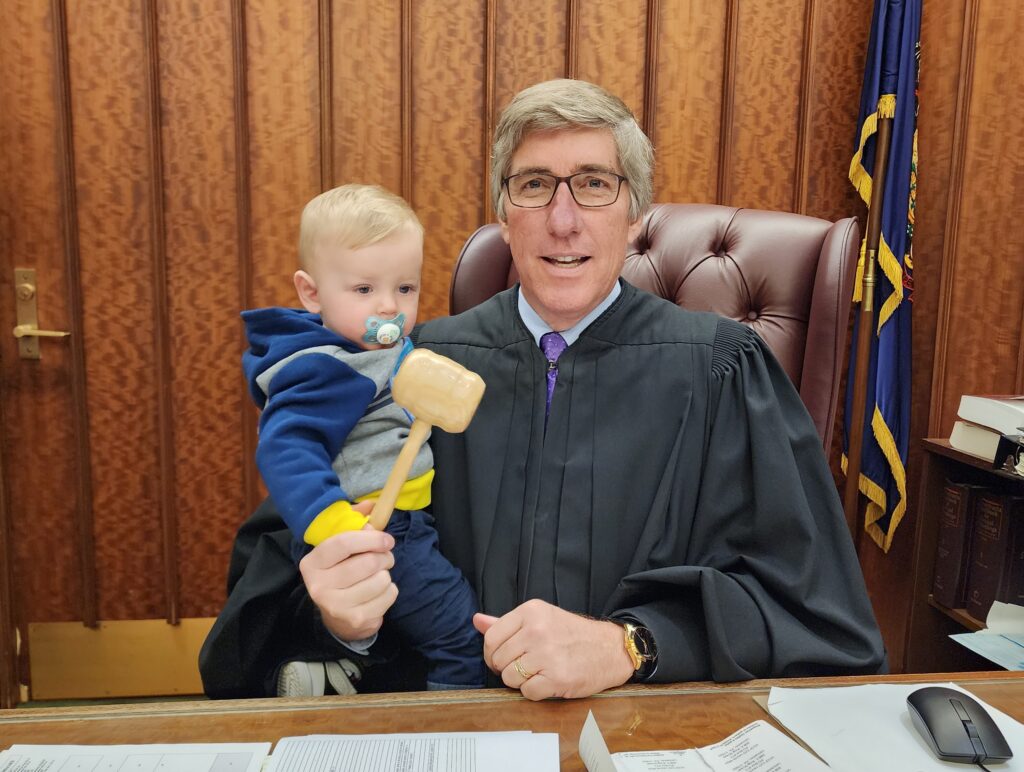
Jeffrey, a history major with minors in psychology and drama. After nearly 25 years of private practice, Jeffrey was elected Judge in 2007 and retained in 2017. He serves as a judge of the Court of Common Pleas of Lancaster County PA and presides over criminal and civil trials.
How has Allegheny prepared you for where you are today?
The smaller class sizes and the culture of personal attention from the professors, particularly in my junior and senior years, encouraged me, and at times, forced me to grow up personally and intellectually. No more hiding and playing it safe in the larger introductory classes. It became sink or swim time but inside, I knew that if I truly tried and still failed, that they would always be there for me.
Could you identify an individual professor or administrator at Allegheny who was especially influential to you? How do you see their influence on you today?
Without a doubt, Jay Luvaas. He was the one who began by guiding me and then, when he felt the time was ripe, pushed me to do more and reach what he felt was my potential. He productively focused my passion for history and, ultimately, oversaw my junior thesis and senior comp. He also introduced me to a group of other men with similar interests and I made lifelong friends with whom I still “campaign” twice a year.
Why is Allegheny College’s interdisciplinary approach to education — the idea that it’s important to teach students to view questions and subjects from multiple perspectives —important? How do you see that in your own experience?
This approach was helpful because it forced me to get out of my comfort zone and expand my horizons into areas I never would have learned about on my own. The history of Jazz, art history, drama, philosophy — stuff that I had never studied before and probably never would have but for Allegheny. One result was that it taught me to view questions from different angles and points of view rather than the one perspective that I came with to Allegheny. This is healthy for everyone but critical to a judge.
What about Allegheny today makes you especially excited?
What I particularly love is coming with my wife Lisa Fields Wright ’80 of 39 years to Allegheny where we enjoy memories of four wonderful years. So much of the campus looks the same which makes those memories return so easily. We always make it a point to kiss on the 13th plank. I also come back for the Soccer Alumni Weekends and reunite with so many lifelong friends I made while wearing the Blue and Gold. My sophomore year team was just recently inducted into the Gator Sports Hall of Fame and 22 guys came back from places all over the world. And for one fun weekend, we were all young again.
Do you have a favorite saying, mantra or piece of advice you’d be willing to share?
One personal mantra is to quote George Bernard Shaw: “Never wrestle with pigs, you both get dirty and the pig likes it.”
In a professional capacity, I share this quote from Carl Bard with many people who come in front of me, ashamed and defeated: “Though no one can go back and make a brand-new start, anyone can start from now and make a brand-new ending.”
Five Questions with Michael John Ryan ’93
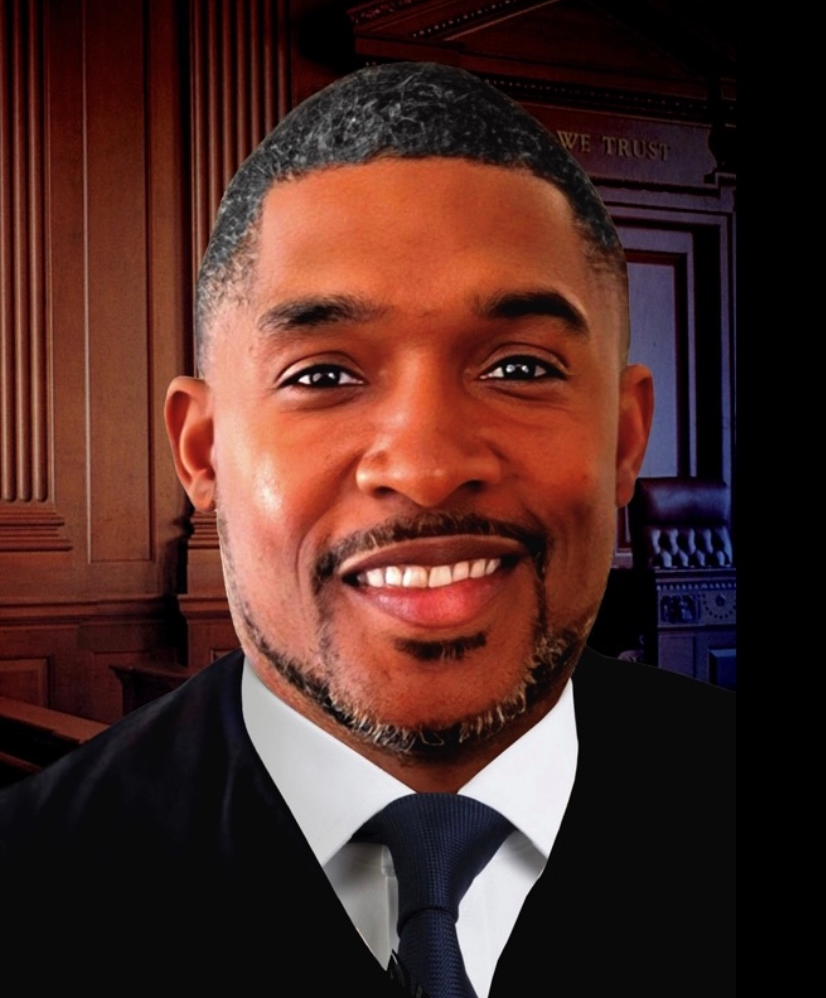
Michael, an English major and political science minor, is one of only two African American appellate court judges in the state of Ohio, serving on Ohio’s 8th District Court of Appeals. He has served as an elected judge for 19 years, and relies on his experience as a former trial attorney, trial judge in the municipal court and common pleas juvenile division as he resolves both appeals and original actions from lower courts within his district.
How has Allegheny prepared you for where you are today?
I entered Allegheny with a disdain for English courses and writing. I did exceptionally well in my high school courses like Algebra II, Pre-Calculus, World History, U.S. Government, Physics, etc. but English was always a struggle. Allegheny College helped to mold me into an individual who was capable of communicating orally and in writing. Every class focused on oral presentation and improving written communication skills. The foundation I received at Allegheny prepared me for law school and the legal profession. People often see attorneys on television in a courtroom advocating for their clients. Yet, most cases are decided by written motions. Accordingly, the oratory and writing skills I received at Allegheny were vital to my success both as an attorney and now as a Court of Appeals judge. I used my oratory skills as a litigator when trying cases before judges and juries. I used my writing skills in arguing motions to either exclude or include evidence, to request cases be dismissed, and to encourage insurance companies and sometimes judges that my clients were entitled to compensation for their injuries.
Why is Allegheny College’s interdisciplinary approach to education — the idea that it’s important to teach students to view questions and subjects from multiple perspectives —important? How do you see that in your own experience?
Allegheny teaches students to think critically and collaboratively. I used — and still use today — that approach in deciding how to decipher facts in a case and then apply the law. You need to possess a diverse perspective in order to both understand what the facts mean in a particular case and to know how to articulate that knowledge to a judge, jury or other related legal entity.
What memories do you have about your senior comp? What impact has your senior comp had on you and your career journey?
I remember reading numerous books and articles as well as relying upon the education I received from prior professors so that I could apply that knowledge to proving my thesis for my comp. I worked assiduously on my comp to the detriment of some of my friendships. I was exhausted and relieved once I concluded my comp, but it prepared me for the work I would do as an attorney and jurist. I would be required to prepare for trial months in advance of the hearing. I had to read reports and witness statements. I had to review the scene, prepare questions for potential jurors, prepare my direct and cross examination questions for witnesses, and complete an opening and closing argument, as well as read case law to support my arguments for and against different legal questions that arose before, during or after trial. I continue to see how the comp prepared me in my current role as an appellate court judge; I read an average of 100 plus pages for each appellate case I preside over.
What accomplishment — professional or personal — are you most proud of?
I am proud of being able to convince my daughter, Lauren N. Conway ’13 (formerly Ryan) that Allegheny was the best place for her to learn, live and grow during her early adult life. I’m glad that she listened and chose Allegheny to be our Alma Mater.
Do you have a hobby or special interest that you are currently pursuing?
I am currently working on a play/movie that is an adaptation of my book, “The Least Likely…from the Housing Projects to the Courthouse.” I hope it’s available for the world to see this year or next year at the latest.
Five Questions with Yasir Shah ’03
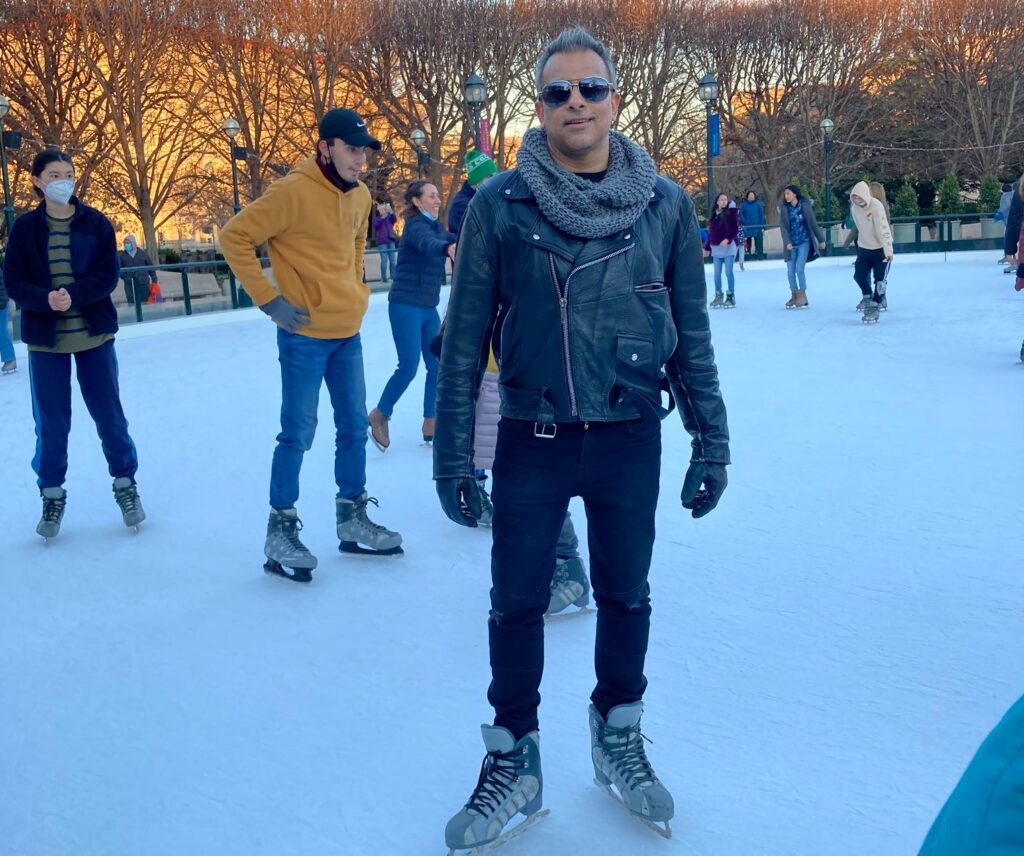
Shah, a communication arts major with minors in psychology and writing, serves as a Grants Management Specialist at the D.C. Department of Behavioral Health, where he manages a portfolio of substance abuse prevention grants, as well as an adjunct professor at the Milken School of Public Health at the George Washington University.
What memories do you have about your senior comp? What impact has your senior comp had on you and your career journey?
My senior comp turned out to be extremely useful for both my academic, as well as my professional journey. I did not realize it when I was pulling all-nighters at the Gators Den [does that even exist anymore?] but those long hours of “comping” would ultimately help chart out my career in public health. As a communication arts major, I did my senior comp on HIV/AIDS social marketing programs in Pakistan, which inevitably sparked a curious interest in public health. After graduation, when I found myself frantically interviewing with various PR and advertising agencies, I happened to mention my senior comp’s topic to a connection I had made when at American University as a junior. It was supposed to be just a casual coffee and catch-up, but intrigued by the topic of my comp, she arranged for me to meet “a friend of a friend”. By the next day, I found myself discussing my comp research yet again, but this time with the person in charge of the HIV/AIDS Administration at the DC Department of Health. Although there were no openings at the agency at the time, I readily agreed to a summer internship which eventually turned into a decade-long career at the same agency. I not only worked in HIV/AIDS prevention programming but went on to spearhead the state-wide adult viral hepatitis program in 2008 and then later managed a school-based STD testing program in DC high schools.
During that decade, I also returned to graduate school twice; once for my MPH and then later for a doctorate in public health at the George Washington University, where I now teach part-time as a professorial lecturer in the school of public health. It would not be hyperbolic for me to state that the research skills I gained during those “comping days” helped prepare me for the research I would later go on to conduct in graduate school. In a way, it was excellent prep for both my master’s thesis as well as my doctoral dissertation. I guess all those grueling hours and caffeinated all-nighters in computer labs – which may have been the bane of my existence as a senior – eventually paid off and helped pave the way for my future goals.
What book is on your nightstand today?
My bedside lamp currently sits on a pile of three books. A signed copy of Just Kids by Patti Smith, White Teeth by Zadie Smith and The Wisdom of Whores: Bureaucrats, Brothels, and the Business of AIDS by Elizabeth Pisani. I also recommend The Bluest Eye [or pretty much any book] by Toni Morrison.
Do you have any hobbies or special interests that you are currently pursuing?
As a student I had no idea how much Allegheny’s interdisciplinary approach to academia and the school’s mantra of “unusual combinations” would help play a significant role in my life’s trajectory. As I mentioned earlier, a major in communication arts introduced and led me to an interest in public health which ended up being the perfect professional fit for me. Writing, on the other hand, was always just a hobby. Even though I did not do too well in my first writing class, my freshman advisor encouraged me to still leave some room for this passion in my life. To heed his advice, I picked up a second minor in writing and would later often return to this “hobby” as a form of catharsis from my day job as a public health bureaucrat. Turns out, another calling in my life was to be an Urdu screenwriter for Pakistani TV. I currently have over ten produced TV shows for local television in Pakistan and it is just an added bonus that a mere “hobby” has now become a fun side gig.
What is one item on your bucket list that you would be willing to share?
A solo trip to Tokyo, Japan. I am still very fascinated by the fashion in the Harajuku District.
Do you have a favorite saying, mantra or piece of advice?
“There is no write way to rite, so keep righting…”
“The most ironic thing to say to a writer is ‘log kya sochain gey’” [log kya sochein gey literally translates in Urdu to ‘what will people think?’]
Five Questions with Joy Johnson ’02
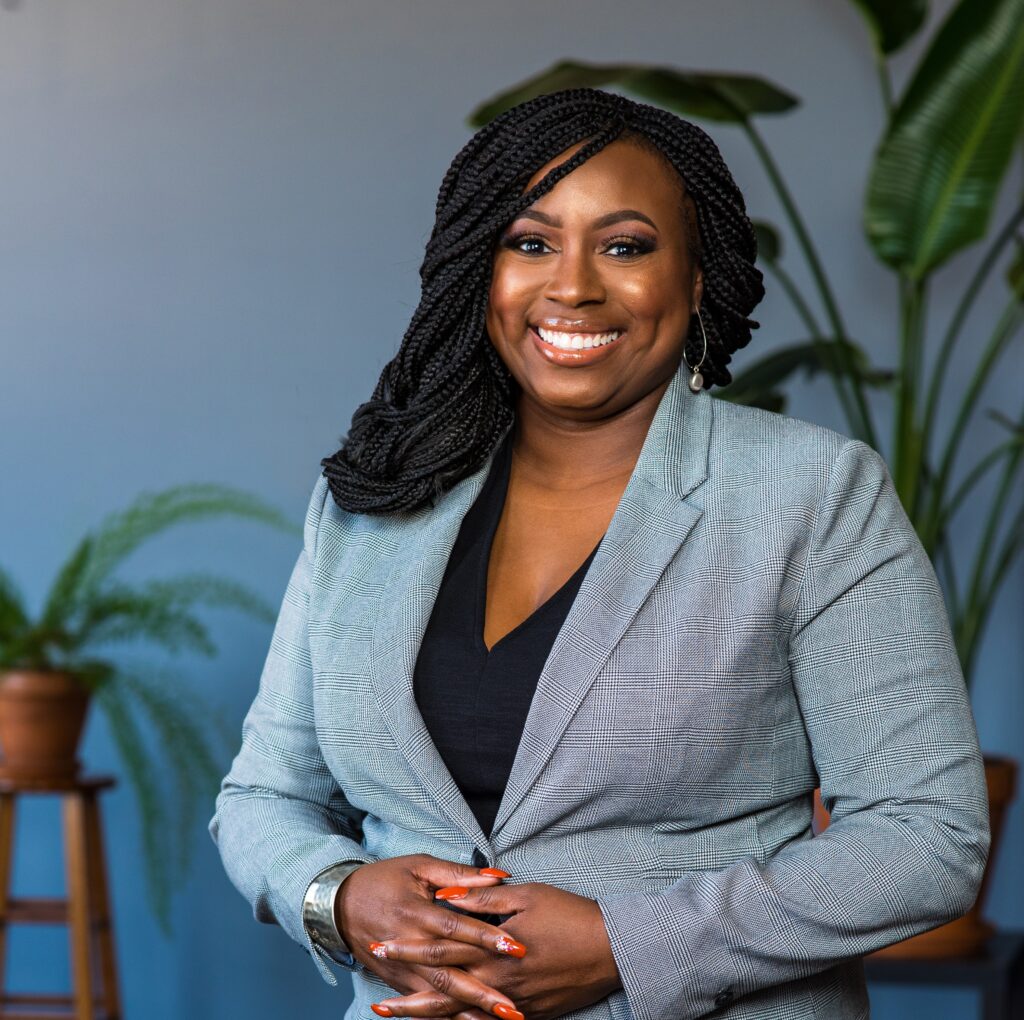
Joy, a communication arts major and political science minor, serves as Executive Director at Burten, Bell, Carr Development, Inc., a non-profit community development corporation located in Cleveland, OH. Named for three civic leaders, the organization focuses primarily on three neighborhoods on the east side of Cleveland with housing, commercial/retail, and greenspace development, and additionally provides supportive programs and services for neighborhood residents.
Why is Allegheny College’s interdisciplinary approach to education — teaching students to view questions and subjects from multiple perspectives —important? How do you see that in your own experience?
Allegheny’s interdisciplinary approach is what prepared me for where I am today. I believe it is especially useful in the field of community development. When you think about all of the things that make a community strong — from political leadership to improved communications to teaching individuals to develop their leadership skills — you see that it involves the sciences, mathematics, political science, communication, psychology, and more. All of those areas help make up a community. So I think a liberal arts education aligns well with community development.
What memories do you have about your senior comp? What impact has your senior comp had on you and your career journey?
My senior comp was The Nielsen Television Rating System and How It Adversely Affects the Portrayal of African Americans on American TV. When I was a kid, one of my favorite cartoons got canceled and I just didn’t understand why. Fast forward to being a communication arts major, I wanted to understand this Neilsen rating system — this mysterious behind-the-scenes thing. Six-year-old Joy wanted to know why she couldn’t watch Fraggle Rock anymore! It is still one of my biggest accomplishments and one of the things I am most proud of. The fact that I could write an 84-page paper! I enjoyed the research process — having a question that you wanted to get answered and having dedicated time to dig in and answer those questions. I gained skills in learning how to narrow down a topic and quantify my theory.
I went back to graduate school in 2011. Until that time, I was able to excel in my career with what I learned at Allegheny, but to continue to advance I needed to further my education. I went back to school, as a mom, working full-time, and I needed to complete a graduate capstone similar to the comp. I’d already had the experience of identifying a topic of interest, digging into it, and putting a framework around it, while working with an advisor. Even though it was more complex because it was in a social science field, I was able to quantify the data and use statistics to analyze it. Because of my Allegheny experience, it was all familiar to me. It was a lot easier!
Could you identify an individual professor or administrator at Allegheny who was especially influential to you? How do you see their influence on you today?
When I attended Allegheny, Director of Diversity Affairs, Dr. Terrence Mitchell, and his wife, Rhonda, supported the campus diversity groups. I still reach out to them occasionally for advice! They created a safe space and provided different opportunities for us to connect with other students of color at other campuses, both in the region and beyond. I remember taking a trip to Kansas to participate in the National Black Student Union Conference where we could meet students from all across the country. It helped me discover my own identity and better understand how I fit into the bigger picture. Some of my longest-lasting friendships came through those connections, facilitated through the work of Dr. Mitchell.
One of my favorite professors was Robert Seddig in Political Science. He made it interesting; he was a good storyteller and he made history relevant to today. My graduate degree is in public administration, which takes what I learned about political science at Allegheny to the next level. My work at a community development corporation is closely aligned with the government; we receive a majority of our funding from local, state, and federal government. Because we interact with the government often, more so than a lot of other traditional nonprofits, understanding constitutional law, understanding how politics works, and how bureaucracy works, is incredibly valuable.
What book is on your nightstand today?
I just finished The Fishermen and the Dragon: Fear, Greed, and a Fight for Justice on the Gulf Coast by Kirk Wallace Johnson. It’s a nonfiction book about environmental justice and the Ku Klux Klan. It shows how racist practices can exploit economic inequalities. It is so interesting, and I found myself reading it until 2 in the morning!
Are there any hobbies or special interests that you are currently pursuing?
Well, reading is my current hobby that I am working on. But I’ve also been binging a show called Queer Eye on Netflix. I thought it was just going to be a makeover show, but they go deep!
They help “heroes” — people who go above and beyond to help others but rarely take care of themselves. It really resonates with me, because I feel like I can relate. Especially after this last year, trying to make sure my daughter got through her senior year of high school and getting her safely off to college. Now I realize I deserve to cook a meal for myself and take time for those things. It’s reminding me to make myself slow down. It’s been helping me think about self-care in another way.
Five Questions with Kris Egers Carter ’91
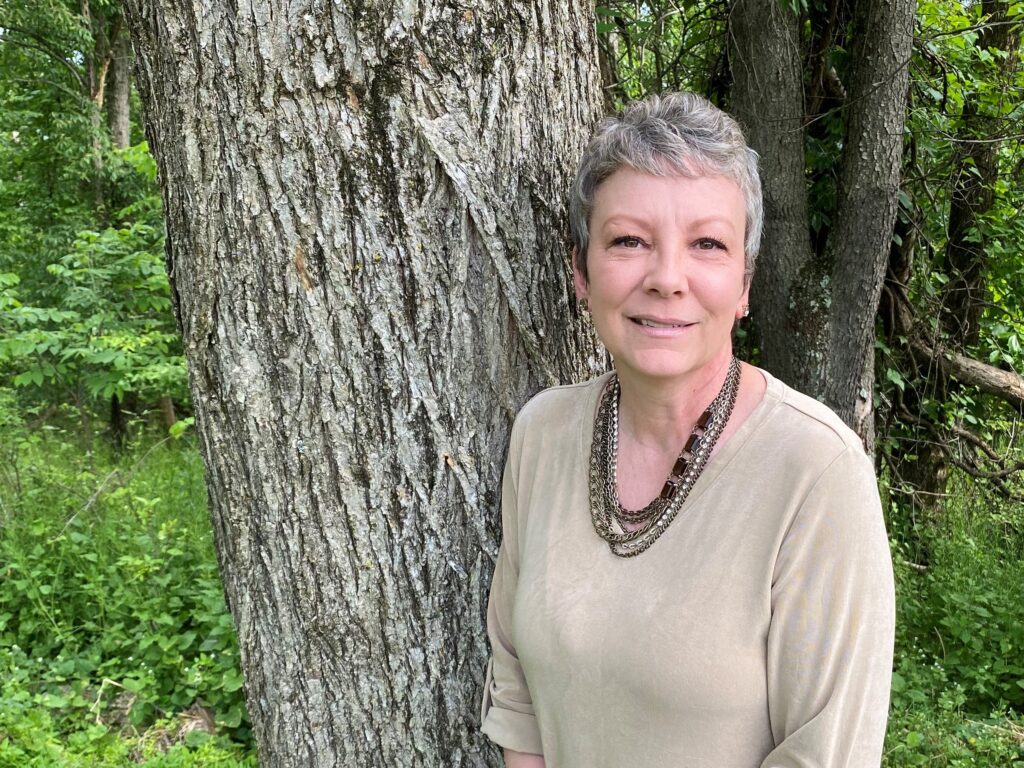
Kris, a geology and environmental science double major, serves as Assistant State Geologist and manages the Geological Resources Division of the Pennsylvania Geological Survey. Kris has worked as a petroleum geologist for the Survey since 2001, and her current research efforts include the characterization of unconventional petroleum hydrocarbon reservoirs; evaluation of depleted/depleting oil and gas fields and deep rock units as potential carbon sequestration reservoirs; and tracking oil and gas exploration, production, and well abandonment activity for the Commonwealth. Earlier this year, Kris was announced as a member of the Biden-Harris Administration’s Carbon Dioxide Capture, Utilization and Sequestration (CCUS) Non-Federal Lands Task Force. Prior to joining the Survey, Kris worked as a consulting hydrogeologist in the private sector for nearly a decade, managing environmental characterization and remediation projects throughout the Appalachian region.
How has Allegheny prepared you for where you are today?
Allegheny taught me how to learn, be independent, and think critically, all while maintaining a balance of healthy skepticism and cautious optimism about the world around me.
Why is Allegheny College’s interdisciplinary approach to education — the idea that it’s important to teach students to view questions and subjects from multiple perspectives —important? How do you see that in your own experience?
The College’s interdisciplinary approach to educating students is, in my opinion, paramount to preparing Allegheny graduates for their future careers. No job involves just one skill set or technical discipline. In my experience, being able to integrate your specialty (for me, geology) with a functional understanding of complementary disciplines (in my case, chemistry, economics, history and political science) makes you much more effective in your work. And when you add in the various soft skills that the Allegheny experience offers, we alumni have many tools to build successful careers for ourselves.
Could you identify an individual professor or administrator at Allegheny who was especially influential to you? How do you see their influence on you today?
It’s difficult to name just one. As a Geology/Environmental Science double major, both Bob Schwartz ’66 and Sam Harrison ’63 were my advisors. Not only did they serve in that technical guidance capacity, they took the time to work with me, offer me opportunities to challenge myself, and showed me empathy when I needed to talk. I will always cherish the years of learning and working alongside them in Alden Hall.
In my current position with the Pennsylvania Geological Survey, I take every opportunity to pay their kindness and mentorship forward with my co-workers and the college interns we host every summer. Bob and Sam’s influence also inspired me to develop Geo 215 — PA Oil and Gas Geology for the College.
What about Allegheny today makes you especially excited?
The interdisciplinary nature of current program offerings, new majors and minors that have been added since my time at Allegheny, and expanded/improved intercollegiate sports programs and facilities are particularly exciting to me. They demonstrate the continued dedication and flexibility of the College to provide rewarding student experiences that translate into successful professional outcomes for Allegheny grads.
Do you have a favorite saying, mantra or piece of advice you’d be willing to share?
Well-behaved women rarely make history…
Five Questions with Jean Stephenson Blair ’81
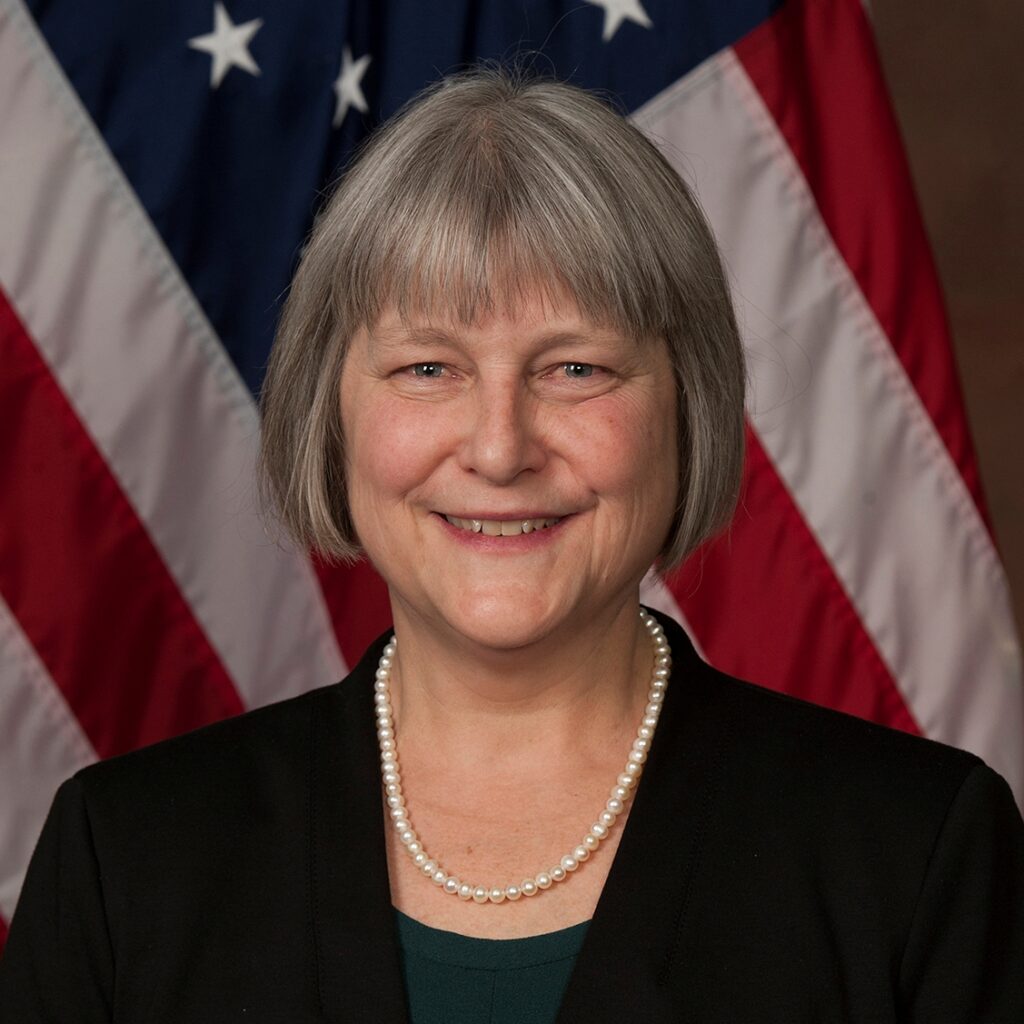
Jean, a computer science and economics double major, is the Electrical Engineering and Computer Science (EECS) Distinguished Professor for Innovation and a Professor of Computer Science at the United States Military Academy, also known as West Point, where she is responsible for three research centers (Cyber, Photonics, and Robotics) and teaches computer science to cadets who, upon graduation, will become officers in the U.S. Army. She also currently serves as the Chair of the Computing Accreditation Commission of ABET, the global accreditor of over 4,000 college and university programs in applied and natural science, computing, engineering, and engineering technology.
How has Allegheny prepared you for where you are today?
The most obvious answer to this is that it gave me a solid academic foundation that enabled me to go directly to graduate school, earning both a master’s degree and Ph.D. in Computer Science from the University of Pittsburgh. But Allegheny did much more for me than that.
Living with and being among peers who had different backgrounds and academic interests helped me not only appreciate very different perspectives while enjoying intellectual banter, but also learn to extract from others why they had those perspectives. Understanding the “why they had that perspective/opinion/position” is a skill that I come back to again and again. Combining that with flexibility and creativity, you can solve almost any problem.
Being a part of Allegheny’s honor-committed community helped me grow in confidence and focus on the excitement of exploring and learning. For me, it became a matter of pride to be so thoroughly trusted, and I have held onto that ever since. When I joined the West Point faculty in 1994, we were encouraged to supplement teaching and research with cadet development outside the classroom. For the more than 90% of the new faculty that were Army officers that was easy; they each had expertise in a sport or valuable military experiences to share. But I immediately gravitated to and volunteered to be a part of what was then called Company Honor Education Teams (CHET); I was assigned to one of 36 cadet companies and jumped in with both feet. Even though I had never been involved with the military before and knew very little about it, I was at home with the concept of living by an Honor Code and had value to bring as a member of their CHET; it was Allegheny that prepared me for that. As the years went by, I have continued to play various roles in helping develop cadets into leaders of character, leading up to my current position as the co-chair of the Superintendent’s Honor Review Committee.
Why is Allegheny College’s interdisciplinary approach to education — the idea that it’s important to teach students to view questions and subjects from multiple perspectives —important? How do you see that in your own experience?
This is a great question! I am an emphatic believer in developing both interdisciplinary skills (a personal approach to problem solving and knowledge development that requires synergy across disciplines) and multi-disciplinary skills (a collaborative approach to problem solving that engages experts from multiple disciplines and achieves more than the sum of individual disciplinary contributions). I believe Allegheny’s unique liberal educational model, with the major-minor requirement, not only requires students to develop their own interdisciplinary skills but also motivates them to engage in multidisciplinary efforts, leading to their developing multidisciplinary skills, including:
- actively seeking input
- listening to fully understand
- effectively communicating with others
- addressing conflict
- facilitating synergy
- leveraging innovation
- thinking critically
- capitalizing on informal relationships
I have found that these skills are essential to being able to build teams, motivate individuals, and inspire organizations to accomplish shared goals. I was fortunate to be given the chance to exercise these skills when, together with Brigadier General Trainor, West Point’s then Chief Academic Officer, I helped lead a large-scale change to our Academic Program Goals, curriculum structure, and the academic requirements to graduate from the United States Military Academy.
Could you identify an individual professor or administrator at Allegheny who was especially influential to you? How do you see their influence on you today?
Dr. Robert Cupper was my teacher and mentor throughout my undergraduate studies. He brought Computer Science to life for me, demonstrating that it is an academic discipline that blends logic and creativity to accomplish what we never thought was possible. (That characteristic of the Computer Science discipline was true way back when I was at Allegheny and remains true now when I am nearing the end of my career.) Dr. Cupper was there to help me when my father died shortly before I started my sophomore year; he guided us through the first Allegheny offering of the Computer Science major; he mentored me through organizing a guest lecture series that brought in computing giants like Rear Admiral Grace Murray Hopper; he motivated me to go to graduate school; and during my senior year he helped me apply to graduate school.
Interestingly, Dr. Cupper also warned me that since I was clearly on a career track, I should say goodbye to the love of my life, Bruce Blair, also from Allegheny’s class of 1981. Dr. Cupper stated in no uncertain terms that he believed that it was not possible for a woman to have both a successful career and a successful marriage and family. Years later, after I had married Bruce, earned the Ph.D, and been on the faculty at the University of Tennessee for a few years, Dr. Cupper and I were able to laugh about his advice; he gracefully accepted that in that one piece of advice, he was wrong. Even that experience, where we both learned, helped me understand life better.
Do you have a favorite saying, mantra or piece of advice you’d be willing to share?
If there is too much resistance to accomplishing something in the way that you are trying to accomplish it, then sit back and look at it from other perspectives. Think about why you wanted to accomplish that specific thing. Discover what about that why is most important to you. Can you satisfy the why by doing something completely different? Can you turn that limitation into a feature?
What hobbies or special interests are you currently pursuing?
I love hiking, going for walks, gardening, creating interesting gifts, and helping design the renovation of our old house. Those interests have persisted throughout my life. Currently, I am most interested in seeing and experiencing the great things our children, their spouses, and now our two grandchildren, are doing. It is a wonder that so much goodness can come from just Bruce and me.
Five Questions with Jeffrey Chips ’05
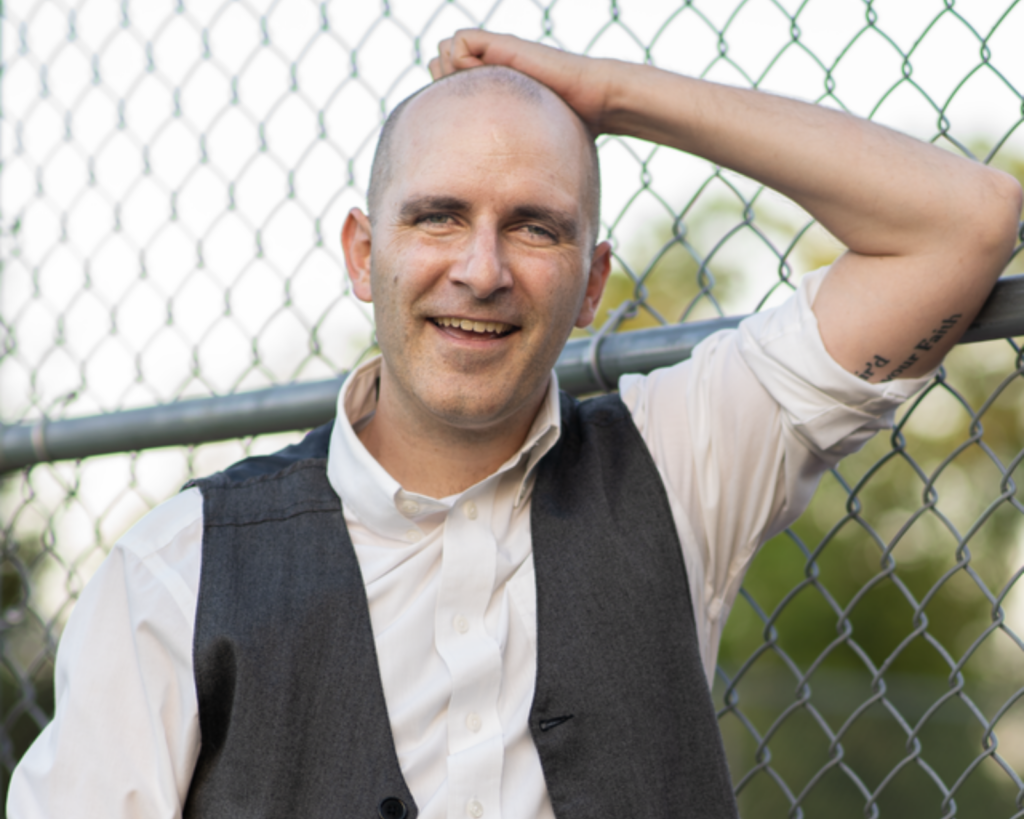
Jeffrey, a theatre major and history minor, is the founder and artistic director of Steel City Shakespeare Center in Pittsburgh, now in its 10th season. Additionally he is a bookseller at Riverstone Books, an independent bookstore in McCandless, and the Program Coordinator at the West View Hub, a community resource center that offers free programs to the community with their library, food pantry and soon-to-be-opened arts center.
How has Allegheny prepared you for where you are today?
Looking at where I am today, I think my answer to this question is twofold and somewhat contradictory; Allegheny taught me to discover my strengths and be bold enough to follow them, but also to always stay curious. I’ve always been drawn to the arts, and I thought maybe I could major in theater. Rather than applying to elite drama conservatories, I decided on Allegheny because I felt that it was a great place to get an education while keeping my options open. By the end of my first year, I was fully committed to a theater major, but at the same time I still felt the pull of choosing a more “secure” major that offered more job opportunities after graduation. What I found over the course of four years, however, was that when I pursued courses of study outside of my interests, I wasn’t as interested and my grades suffered. But the more I pursued my theater studies, the more my grades excelled. By my junior year, I had quantifiable data in the form of my transcripts that clearly demonstrated that majoring in theater was the right choice.
On the other hand, Allegheny’s entire philosophy of education is to celebrate curiosity. Some of my favorite classes and experiences were the ones that pulled me out of my comfort zone. I took courses in Russian and Japanese history and a physics for non-majors class that I absolutely loved. I took a photography course. And the class I took in environmental science ignited my passions just as much as the best classes in my major. What I knew to be true at the time — and what I still believe to my very core — is that curiosity and a lifelong love of learning is the foundation of a great education, and too often, I feel that we place too high a priority on the career or trade that comes as a result of a person’s education.
Where these two, somewhat contradictory, ideas came together in my own life was in January of 2021, when I was let go from a job I’d held for eleven years. Despite my great passion for theater, I’ve never been fortunate enough to earn a consistent living from that work alone. With a spouse, three children, a dog, and a mortgage, working a steady job with consistent hours, benefits, a decent paycheck, and a general sense of job security felt like a wise choice, and it definitely was for several years. I have zero regrets. However, between the Covid-19 pandemic and a steady rise in automation, I quickly discovered that the notion of “job security” is kind of a myth. For months, I applied for work in similar fields to the one that I’d just left and found that not only was I not a good fit for those particular companies, but I also really didn’t enjoy doing the job that I’d been doing for so many years. After months of rejection and silence, I decided to simply pursue opportunities in line with my strengths and to allow my curiosity to be my guide. It’s taken quite a while to find my footing professionally, but I can honestly say that I love getting up and going to work every day and being passionate about what I’m doing.
What memories do you have about your senior comp? What impact has your senior comp had on you and your career journey?
Oh, boy! If not for my senior comp, my life would look very different today. Toward the end of my junior year, I decided I wanted to do a performance comp, and the standard practice for theater majors was to take on a leading role in one of the Playshop productions in their senior year. I spoke to each of the theater faculty members who would be directing a production the following year. Dan Crozier informed me that he would be directing something by Shakespeare in the fall, and he’d be thrilled if I wanted to do a performance comp with him.
At that point, I’d seen some great Shakespeare, having traveled to London with Beth Watkins and Jim Bulman the summer after my sophomore year. I’d been to the RSC and the Globe and had seen the great Mark Rylance perform more than once. I’d studied some Shakespeare in my classes. He was fine, but I was more excited by the Greek tragedians and a few 20th century playwrights. But, hey, doing a Shakespeare comp sounded like fun, so why not?
Dan chose As You Like It for the fall production and cast me as Jaques, and I became a lifelong Shakespeare addict. I remember first reading the script and struggling to comprehend some of the complex language, but then Dan introduced me to the Oxford English Dictionary – a comprehensive dictionary of the English language that gives you the full history of a word, including literary citations – and that’s when my imagination took off. I had a deep understanding of every single word of dialogue I spoke and an emotional connection to it, as well. And Dan was the kind of director who always encouraged me to follow my own curiosities. I remember sitting in his office discussing my character and a certain impression I had. I distinctly remember him saying, “I’m not sure that I agree with you, but I think you should pursue that if you feel strongly about it.” What an incredible amount of trust for a director to give to a student actor! Any time he thought I was getting overwhelmed or was overthinking, he reminded me to, “Make the choice that’s going to be the most fun.” And that’s what I would do.
For three years prior, I remember feeling intimidated by the idea of a comprehensive project. They always seemed like such a slog for the seniors, and I wasn’t looking forward to doing mine. When the time came for me to do my comp, I loved every moment of it. It gave me some of my best memories of my four years at Allegheny.
Could you identify an individual professor or administrator at Allegheny who was especially influential to you? How do you see their influence on you today?
There were many. The theater faculty during my four years were a lovely group of people who were incredible mentors – Beth Watkins, Mark Cosdon, Martin Marchitto, and David Jortner. I think only Mark is still at Allegheny, but I try to keep in touch with all of them as best I can.
Two faculty members in particular had the biggest impact on me – Dan Crozier and Jim Bulman. I still hear Dan’s voice when I’m teaching my Shakespeare students or directing actors. He absolutely loved teaching, and I think he saw directing theater as the ultimate form of teaching. When he started a production, it was like he picked out the canvas and had selected the pigments, but he invited everyone to pick up a brush and paint alongside him. The more you got your hands dirty, the more excited he became. The bolder the brushstrokes you took, the more emboldened he felt. I do a lot more directing now than I do acting, and this is exactly the approach I like to take. And when I’m working with younger students, I find that I have a certain love of creative chaos that Dan imprinted on me all those years ago.
Jim Bulman was another teacher who left an indelible mark on me, and I remained his pupil for a few years beyond my undergraduate education. I first really got to know him traveling to London with him and his wife, Beth Watkins, in the summer of 2003 (how is that 20 years ago?), and I had such a great time learning from him and getting to know him outside of the classroom. He and Beth were such terrific hosts. In my senior year, I took his Advanced Shakespeare class while also working on my senior comp, and when we got to the unit on As You Like It, he had me recite the Seven Ages of Man speech to the class and had students check to make sure I got all of the words correct. Indeed, I got them all correct.
On several occasions over the next few years, I sought out Jim’s mentorship. The first time I directed a Shakespeare play – Measure for Measure – I drove to Meadville for an afternoon to discuss the play with him over lunch. When I applied to grad schools, he was very encouraging of my desire to study Shakespeare and Performance at Mary Baldwin University and wrote a letter of recommendation on my behalf. While a student in the program, working on my first of two Master’s theses, he served on my thesis committee and challenged me just as hard as he did when he was my undergrad professor.
What book is on your nightstand today?
I’m a bookseller, so that’s a complicated question. There are a ton of books on my nightstand in various stages of completion. The other day, I started The Adventures of Amina Al-Sirafi by Shannon Chakraborty. It’s kind of inspired by and in conversation with The Seven Voyages of Sinbad, a story that I absolutely love, so I’m pretty excited to be reading it.
As for books I’d recommend, my favorite book released in 2022 was Tomorrow, and Tomorrow, and Tomorrow by Gabrielle Zevin. The Shakespearean title caught my attention, and the story was so unexpected and fulfilling that even a slow reader like myself was fully enthralled by it.
Do you have a favorite saying, mantra or piece of advice you’d be willing to share?
When I was in charge of the Student Experimental Theatre at Allegheny, and we were constantly biting off more than we could chew, rehearsing plays into the not-so-wee hours of the morning, fueled by caffeine and hubris, I remember repeating the phrase, “Let’s do the best with what we have to work with.”
Steel City Shakespeare Center has what I like to call a DIY approach to making theater, and I’m quite proud of that. So all of those hard-earned lessons learned in a white hot panic in those SET rehearsal rooms has taught me to be rather resourceful in my artistic approach. Over time, I developed a sort of riff on my previous mantra, stressing, “Presence over perfection.”
That mantra evolved further while teaching Shakespeare to kids over Zoom in the midst of the Covid-19 pandemic. Before each class meeting, I would be texting with my fellow teachers, all of us feeling wholly ill-equipped to teach these kids anything when we were barely holding it together ourselves. What we found, though, was that all these kids wanted was some time to connect with other kids and to get creative with whatever resources they had within their reach. So we adopted the phrase, “Let’s Mister Rogers the sh%t out of this!” and it hasn’t led us astray.
Five Questions with Heather Bosau ’17

Heather, an English major with an emphasis in Creative Writing and self-designed Social Justice and Legal Studies minor, attended law school and now serves as an assistant public defender with the Knox County Public Defenders Community Law Office in Knoxville, Tennessee. She is currently assigned to the county’s felony court, representing individuals charged with felonies who cannot otherwise afford an attorney.
How has Allegheny prepared you for where you are today?
I think Allegheny prepared me to be a lawyer in many ways that I might not have otherwise been at other institutions. It was at Allegheny where I learned to approach my work (and others) with passion, care, and compassion. At Allegheny I was encouraged to pursue my interests and to build community and, candidly, it was at Allegheny where I truly began to learn about my true, authentic self. Without the interdisciplinary, holistic approach to learning that I experienced at Allegheny, I don’t know that I could have found myself in a profession that takes a holistic, client-centered approach to the practice of law.
Why is Allegheny College’s interdisciplinary approach to education — the idea that it’s important to teach students to view questions and subjects from multiple perspectives —important? How do you see that in your own experience?
I think Allegheny’s interdisciplinary approach to education is important because in many ways it provides a microcosm for the world outside of college. While Allegheny itself is a relatively small, close-knit community, being taught from the start to explore different perspectives and experiences helps students (it certainly helped me) prepare for a world outside of Allegheny that wasn’t quite as insulated. As Allegheny students we’re taught to look at the world through a critical lens, to ask questions, and to be curious.
As a lawyer, and perhaps specifically as a public defender, I’m interacting with folks at different stages in their lives who are experiencing the world in a variety of ways. Recognizing that my own perspective is just one of many, and that my own experience is just one of many, is critical to my ability to do my job effectively.
Could you identify an individual professor or administrator at Allegheny who was especially influential to you? How do you see their influence on you today?
Oh gosh, there are so many professors at Allegheny who inspired me, influenced me, and supported me. I credit professors Ferrence, Prince, McIntyre, and Harward and so many others with helping me achieve all that I did at Allegheny and beyond. I do, however, remember Professor Angela Keysor of the history department in particular, as a former lawyer herself, who took so much time to answer my countless questions about the career. She even helped me after law school when I was feeling a bit overwhelmed by my career choice (especially in the midst of the pandemic) by continuing to answer all the questions I had. (I also loved her women’s history class that I took!)
What book is on your nightstand today?
I am currently reading I’m a Fan by Sheena Patel. For years, it’s been my goal to read the entire Women’s Prize longlist before the winner is announced. So far, I haven’t been successful, but maybe this will be the year!
Hobbies or special interests that you are currently pursuing:
I’ve always loved reading and writing, so I’m still doing both of those. Recently, I’ve also started teaching myself to sew and am exploring various forms of visual art. Since the pandemic started, I’ve intentionally started to pursue hobbies that interest me — but that I’m not always particularly good at — because I’m trying to be better about enjoying the process and being gentle with myself when something doesn’t go quite according to plan. (I’ve sewn many dresses that don’t quite look like dresses!)
Five Questions with James Trippi ’75
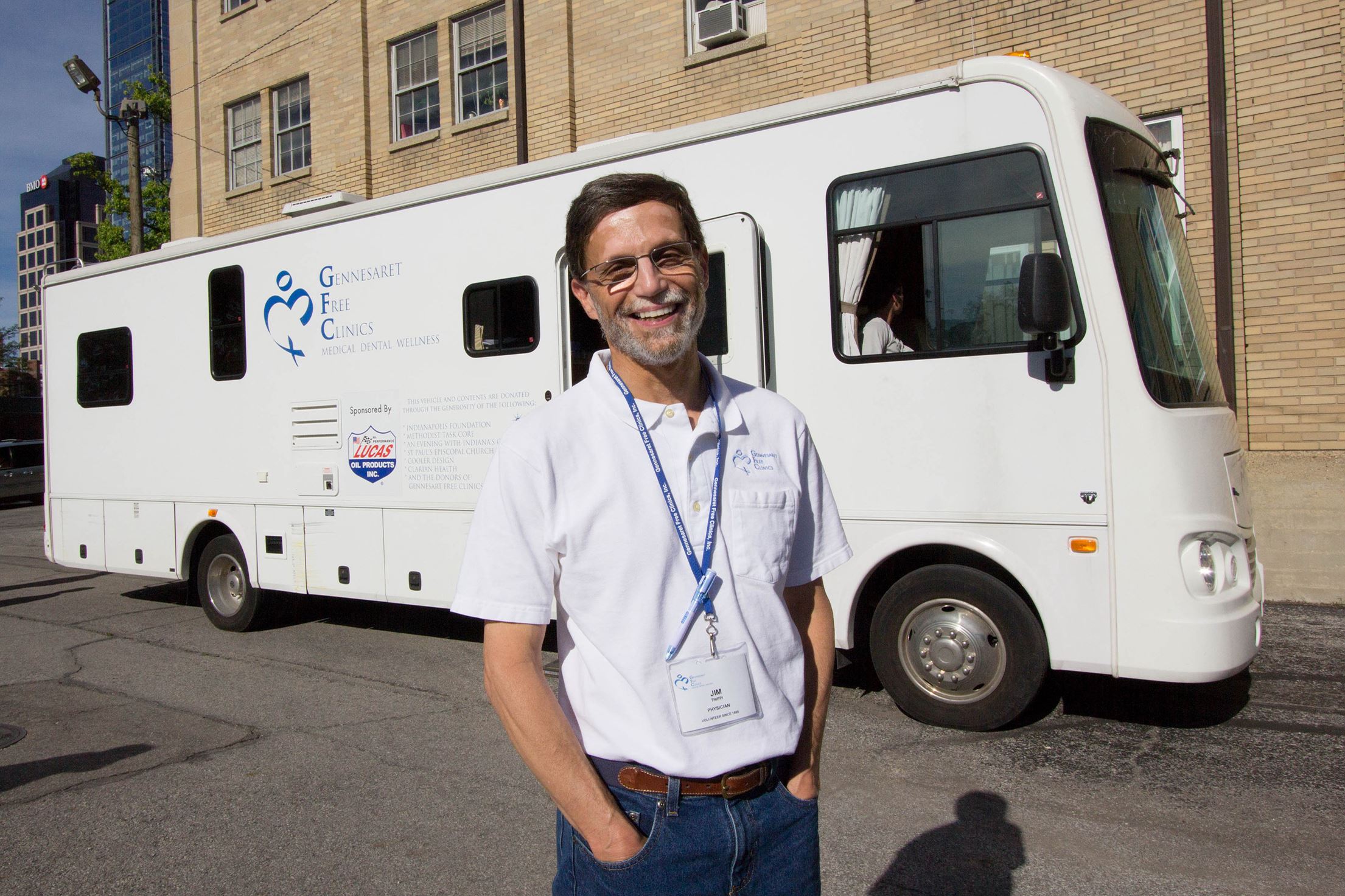
James, a Chemistry major, currently serves as a cardiologist and lipidologist with Ascension Medical Group. As a student, James was involved with Concert Band and the Newman Association, and worked at the Meadville General Hospital Emergency Department as an orderly. He recently retired as Founder & Board Chair of Gennesaret Free Clinics, which provides medical, dental, women’s and respite housing care for the homeless and medically uninsured of Indianapolis.
How has Allegheny prepared you for where you are today?
A strong Allegheny science background was necessary for medical training. Yet, liberal arts subjects broadened our formative years by exploring deep thoughts, appreciating the arts, and contemplating the issues of the time. Student colleagues and dear friends helped me choose my career, life and spiritual directions.
How has service and volunteerism played a role in your life? Did Allegheny help shape those core values in any way?
Even though my years at Allegheny were financially lean, finding time to help others as a volunteer remained a focus. I recall visiting the Montgomery County Home where developmentally handicapped persons resided. Helping with Catholic Mass was a favorite activity. In my early career years, volunteering as a medical provider for those without insurance continued in my “off hours.” Those volunteer times were always a privilege and enriching in an intangible sense. Seeing our Gennesaret Free Clinics grow and help thousands moving toward healthy lives stands as my career’s greatest achievement and love.
Why is Allegheny College’s interdisciplinary approach to education — the idea that it’s important to teach students to view questions and subjects from multiple perspectives — important? How do you see that in your own experience?
Combining the attributes of science and the liberal arts naturally lends itself to the helping professions. Teachers, social workers, health professionals and community leaders depend on multiple disciplines in their careers. Personally, through my varied subjects at Allegheny, I discovered a wider world. My Allegheny years have served me well in my career and beyond.
What about Allegheny today makes you especially excited?
Allegheny College ranks as a national leader in Global Health Studies. At Allegheny, students participate in cultural and language studies prior to traveling to locations across the globe. During their international summer semester, they experience community health issues, cultural differences, and develop a broader world perspective. Scholarships help students who might otherwise require employment to cover college expenses.
Do you have a favorite saying, mantra or piece of advice you’d be willing to share?
I certainly endorse following one’s passion as a career or as a volunteer. Restricting activities to only those that provide recompense misses so many opportunities packed with personal growth, meaning, and social interaction. Whether it be assisting in activities your family is involved in or community organizations, or blazing your own trail, reaching out and “providing a hand” fills our hearts if not our wallets.
Five Questions with Larry Weiss ’74
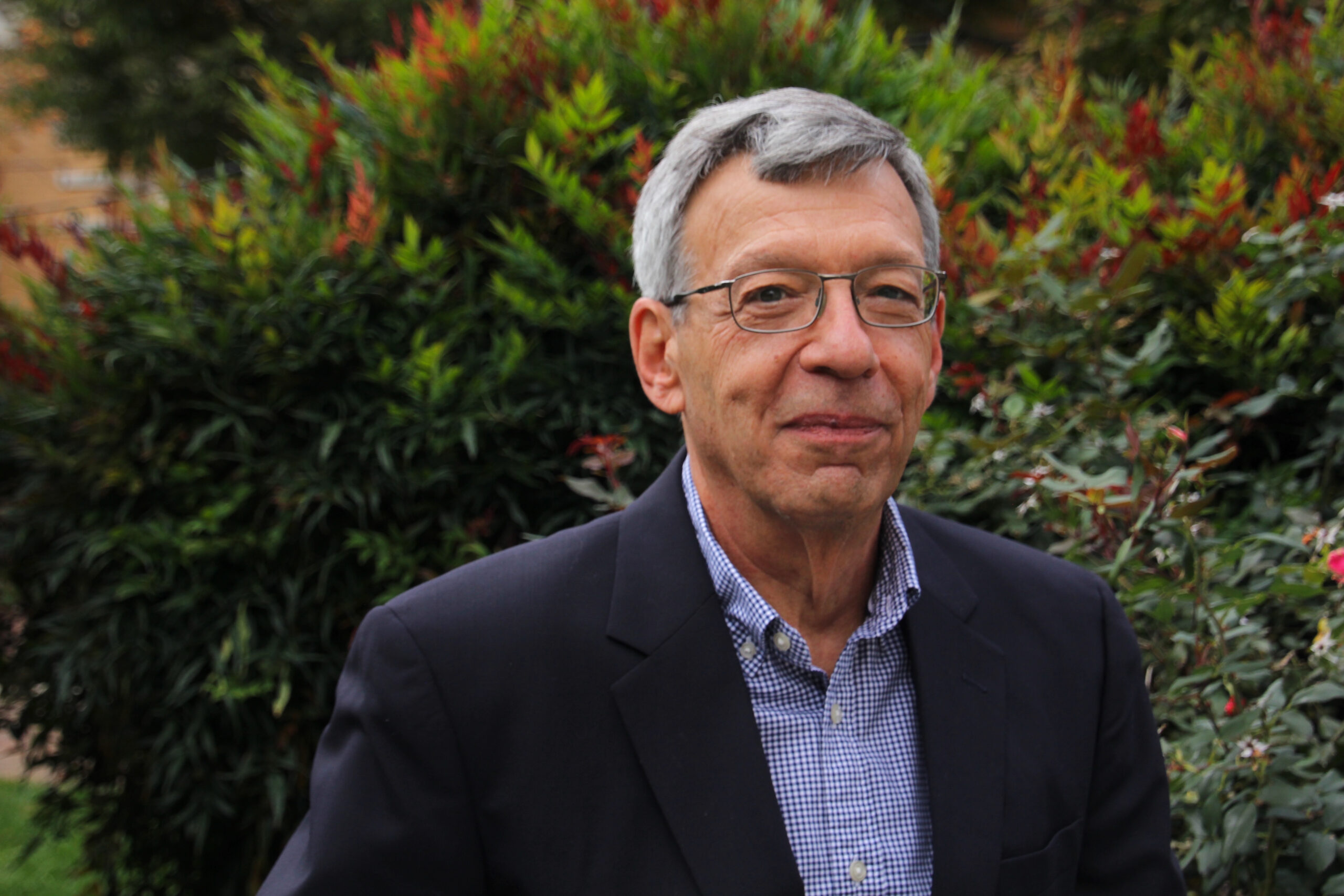
Larry Weiss ’74, a Speech major, currently serves as the Executive Director of the Winchester Education Foundation. As a student, Larry was involved in WARC, which launched a 42-year career in radio starting at WMGW in Meadville. Larry managed radio stations in multiple states, and later ran large station clusters in Ohio, Pennsylvania and North Carolina. Larry was also involved in soccer and Phi Kappa Psi fraternity and served on the Interfraternity Council.
How did your experience with WARC contribute to your time at Allegheny?
In retrospect, I probably should have spent less time at WARC and more time at Reis Library. I did shows every term for four years and enjoyed every one. My involvement at WARC bridged a gap for me. Radio was a hobby of mine from youth. WARC began the journey to turn my hobby into a successful career that allowed me to sustain a family.
Could you identify an individual professor or administrator at Allegheny who was especially influential to you? How do you see their influence on you today?
Professor Jim Smith had a huge influence. In 1975 he joined the Speech Department, and he rescued me from a terrible speech pathology comp project, encouraging me to do a radio market study instead. This experience was vital to my decision to attempt a career in radio.
What book is on your nightstand today?
A few things are stacked up. “The Midnight Library” by Matt Haig is up next. Also on deck is “Graveyard Bay,” the third of five books in the Geneva Chase mystery series written by my close friend Thomas Kies. The story of Tom’s writing career is truly inspiring.
Do you have a favorite saying, mantra or piece of advice you’d be willing to share?
My first mentor in the radio business, after promoting me into my first real significant position, cautioned me in 1979 to proceed “calmly and quietly.” I have followed (or tried to follow) that advice daily since that day.
What is one item on your bucket list that you would be willing to share?
I’d love to be around in 2024 for my 50th reunion at Allegheny!
Five Questions with Trevor Rusert ’94
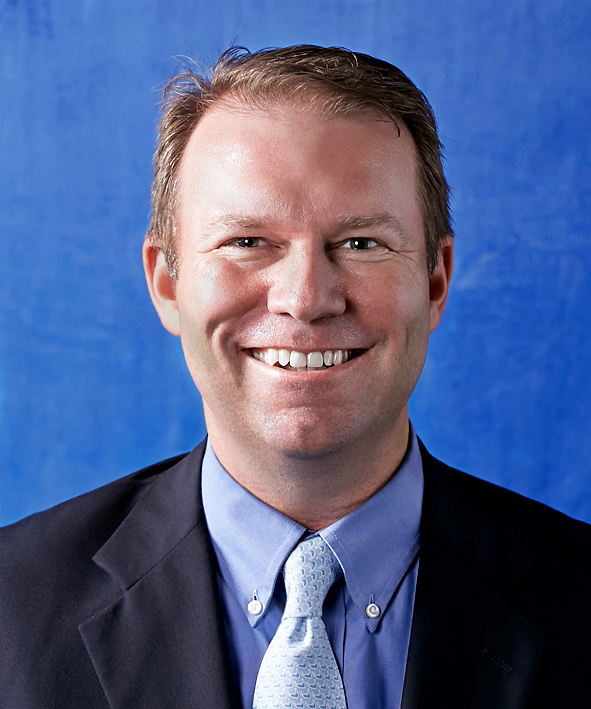
Trevor, a Political Science major, is the Co-Director of College Counseling at Graded – the American School of São Paulo. He educates and supports students and families through the complexities of the college admission process. Additionally he is involved in regional, national and international organizations serving the admission and counseling profession. During his days as a student, Trevor served as IFC Vice President and as a student athletic trainer, and he was a member of Delta Tau Delta.
How has Allegheny prepared you for where you are today?
First, I would point to the liberal arts education and specifically the Political Science Department for helping me to develop my communication skills. Writing and public speaking are essential skills in the college counseling profession. I would also point to the many clubs and activities that enabled me to meet and become friends with diverse students from all over the country and the world. Finally, in the summer of 1993, I stayed on campus and worked as an Admission Office Tour Guide. It was dubbed the “summer of love” by those who were there. The admission office at Allegheny was a fun and interesting environment in which to work, and the experience introduced me to the profession of admission counseling. The tour guide program at Allegheny was so well known for producing outstanding admission professionals that other colleges would call and ask if they had any tour guides that might be interested in admission work. In my case, this is exactly what happened, and it helped me land my first professional job as an Admission Counselor at Carnegie Mellon University.
What hobbies or special interests are you currently pursuing?
Golf is probably my favorite hobby, although I haven’t yet had a chance to play a round after moving to São Paulo this July and hitting the ground running in my new role. Once things slow down, that will be at the top of my list. I would also say that one of my favorite interests is traveling internationally with my family, learning about different countries, exploring new cultures, trying new foods, etc. In 2015, my wife, Heather (Fowkes), Allegheny Class of 1993, and I decided to move overseas, and this journey has been one of the best decisions we’ve ever made. We spent seven years in South Korea and had opportunities to travel all over Asia. We experienced things that I would never have imagined possible and along the way exposed ourselves and our children to amazing people and cultures all over Asia. Now, I can’t wait to explore Brazil and South America.
Could you identify an individual professor or administrator at Allegheny who was especially influential to you? How do you see their influence on you today?
There are probably too many to cite them all, but I can think of many who influenced me along the way. Professors Anthony Lo Bello, Leona Pallansch, and Giles Wayland-Smith were particularly influential. They instilled in me the desire to be a lifelong learner, to treat people with respect and kindness, to not always believe what is said or written, to analyze information for myself, and to never be afraid to respectfully disagree. Those are all lessons that have served me well and will continue to serve me well in the future. I have to mention all of our football coaches (in particular Joe Philbin, Jack Leipheimer, and especially Ken O’Keefe — and many more). They taught me a lot about grit and teamwork. All of the stories and life lessons Ken would share — his story of the Lincoln-Douglas debates and how he related that to football is the stuff of legend and something I still remember today. The athletic training staff of Jamie Plunkett and Cathy (Stoner) Madigan. They gave me my first job at Allegheny and I worked with them for all four years. They were amazing people who gave their all to support our athletes every time they took to the fields or courts. Finally, I have to mention the admission counseling staff that was there while I was a tour guide (Gayle Pollock, Linda Clune ’86, Megan Murphy ’88, Chris Nicolussi ’91, Jim Davies, and Jonathan Pittman ’89). I wouldn’t be where I am today without their support and guidance, and willingness to take a 21 year old under their wings to teach me about this profession. I learned things from each of them on how to be a professional, how to represent a college, and how to help high school students and parents explore colleges.
Do you have a favorite saying, mantra or piece of advice you’d be willing to share?
“Twenty years from now you will be more disappointed by the things that you didn’t do than by the ones you did do. So throw off the bowlines. Sail away from the safe harbor. Catch the trade winds in your sails. Explore. Dream. Discover.” — Mark Twain
How has the Allegheny alumni network made an impact on your life?
One of the most incredible things about Allegheny, particularly as it relates to college admissions and counseling, is this incredible network of professional colleagues. In addition to the admission staffers mentioned above, I have worked with and continue to work with so many amazing Allegheny alumni. When I graduated from Allegheny in 1994, it was Becky Lombardi ’92 who called the admission office and asked if any recent tour guides were graduating and looking for work. I ended up working with Becky at Carnegie Mellon for 11 years. In 2005, another former Gator, Jennifer (Firek) FitzPatrick ’95 reached out to see if I would be interested in switching from admissions to college counseling. I worked with Jen for seven years and realized that my true calling was helping students and parents through the admission process. Then in 2015, Terry Giffen, Jr. ’73 introduced me to an opportunity at Chadwick International in South Korea, where he was serving as interim Director of College Counseling. Terry helped Heather and I to make that jump overseas and think through the process of packing up our children and moving to the other side of the world. Over the past 29 years in admissions and college counseling, I have been incredibly fortunate to work and collaborate with Allegheny alumni like all of those mentioned above as well as folks like Susan (Garrity) Ardizzoni ’82, Bruce Hunter ’77, Bruce Neimeyer ’89, Liz Hamlin ’91, Martin Vaughn ’94, Jenn Decker Winge ’96, Ann-Marie (McFall) Strauss ’96, Peter Olympia ’97, and many others.
I’m sure that I’ve missed a lot of people, but needless to say, there were countless faculty, staff, and students during my time at Allegheny, and many alumni in my line of work that have helped shape the type of person and professional I aspire to be.
Five Questions with Kathy Ramsay ’71
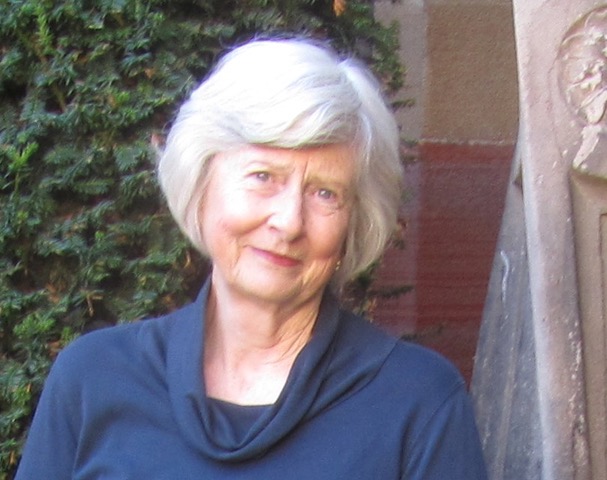
Kathy, an International Studies major, worked for many years in mortgage banking before transitioning to real estate development of residential, industrial and commercial properties. Later in life, Kathy joined the U.S. Department of State Foreign Service and lived and worked in China, Hungary, Russia, Slovenia and Turkmenistan. She now describes herself as “blessedly retired” and calls this her finest hour.
Why is Allegheny College’s interdisciplinary approach to education — the idea that it’s important to teach students to view questions and subjects from multiple perspectives — important?
This is a subject that is near and dear to my heart. When I attended Allegheny as a member of the Class of 1971 (be still my beating heart!), the College had a shell department known as International Studies. To be accepted to complete a major in that department the student prepared and submitted a petition to the Instruction Committee. The petition needed to include all the courses that were to be ‘required’ for the major and justify why each was included and how the overall course requirements constituted a legitimate major of academic consequence. To do this I made an appointment with the Dean of Instruction, Jonathan Helmreich, and he guided me through the process. I was ably assisted by Bruce Clayton, Wayne Merrick and Blair Hansen who represented the interests of the History, Political Science and Modern Language Departments respectively. This freedom and level of support was largely unavailable in large educational institutions at that time. It was a singular opportunity to be my own intellectual guide for my 4-year degree and instilled a fierce independence in me for my entire life. It always amazed me how many of my classmates did not even know we could do this, but thorough research will always pay off in life. A very good life skill in itself!
What memories do you have about your senior comp?
My memories of my comp really stem largely from my journey that began with that petition to become an International Studies major. I needed to maintain the interdisciplinary approach with its research and writing and, ultimately, during my oral. I found a way to research French language documents as well as English resources, and my oral was conducted in French as well as English. Dr. Hansen was a champion in getting my spoken French brushed up outside of the classroom, Dr. Merrick gave his usual valuable insights into international affairs and several professors in the History department lent unstinting support. As one of the first of my classmates to pass the oral, I was treated to a great party that evening and for the rest of my life was able to say I graduated first in my major department. No one ever thought to ask how many were in that department!
What book is on your nightstand today?
I’m going to address this with a high degree of latitude, as we have so many ways to obtain information these days. Rather than listing books, I would say that Allegheny left me with a thirst to be a lifelong learner and my nightstand reading is only part of the story. There are now extensive university programs targeting retired ‘students’ in classroom and virtual environments and they, along with newspapers, magazines, on-line and traditional libraries, podcasts, and recorded lectures and taped shows on the internet and streaming services allow all of us to chase new ideas and to learn more about fields of interest we have always had. I seize a new idea or event that does or should interest me or involves my travels and then treat it as a research project by drawing from all these sources. This is reflected in my nightstand books, as well as articles saved on my iPad and podcasts on my smart phone for my daily walks. I love what I can uncover that I never knew. Those books on the nightstand are always changing in topic and being augmented by these many other media sources. That said, there is always a very good mystery among them!
What about Allegheny today makes you especially excited?
I have really been captivated by the complete renovation of Bentley Hall. To me, that project is a physical manifestation of all that Allegheny holds dear and promotes among its students and faculty: respect for the past, moving with the times, executing for its own account what it holds up to others as ideals for the world today and tomorrow, and the commitment of its alumni and supporters to fund it and do it right the first time around. It is a statement for all the years since 1815 and will be that for many years into the future, thanks to the work of the last few.
Do you have a favorite saying, mantra or piece of advice you’d be willing to share?
Don’t expect life to give you 100%, but do expect that you should stay on the winning side of 50%. If you are not, then take charge and see what needs to be done to improve the percentage. Then do it! We can have more control of our destiny than we sometimes realize, even as we must also depend on the good graces and breaks provided by others.
Five Questions with Dan Koller ’96
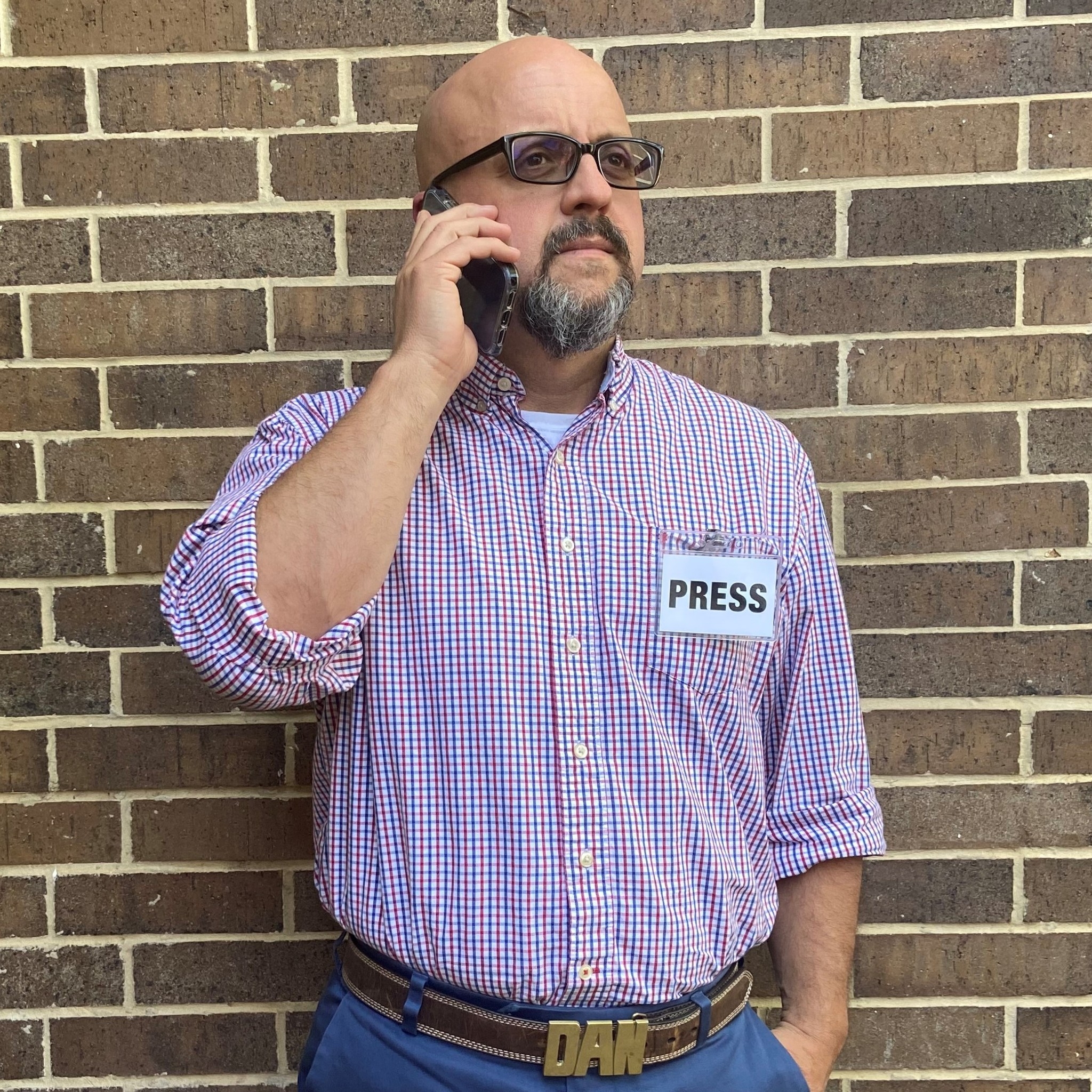
By day, Dan works as a writer and editor for a labor union in the aviation industry. His side-hustle is publishing the Coppell Chronicle, a weekly email newsletter that he began in 2021 about the Dallas suburb that his family has called home for the past decade. He has about 600 paid subscribers, with a goal of 3,000, and reports on the most interesting parts of local government meetings – city council, school board, zoning commission, etc. – with a dash of humor. Dan was a Communication Arts major and participated in Student Experiment Theater, Playshop, WARC and The Campus.
How has Allegheny prepared you for where you are today?
I’m pretty good at coming up with a Plan B when Plan A falls through, and I attribute that skill to my Allegheny education. This has been helpful in both my career and in my personal life. Here’s an example from the latter: The older of my two teenage sons has multiple mental disabilities. During an annual physical, he refused to stand next to a height chart. The nurse’s alternative strategy was to have him lie down on a table lined with paper, so she could use a Sharpie to mark where his feet and head were, but he wasn’t having that either. So I hugged him tightly and told the nurse to put a mark on my shirt, directly above his head. I then stood next to the height chart so we knew exactly how tall he was. That shirt was a small price to pay to solve that problem.
Could you identify an individual professor or administrator at Allegheny who was especially influential to you? How do you see their influence on you today?
This is going to sound like a joke, but it’s not. Jan Hyatt taught my Introduction to the Humanities course when I was a freshman, and I also took a P.E. course that she led called Fundamentals of Movement. I occasionally notice during stressful moments that I’m walking in a way that is not fundamentally sound. That’s when I remind myself, as Jan often said, to lead with my pelvis.
Why is Allegheny College’s interdisciplinary approach to education — the idea that it’s important to teach students to view questions and subjects from multiple perspectives — important?
In today’s society, when so many people’s views on a variety of subjects are dictated by pundits and politicians on only one side of the aisle, it’s more important than ever.
What book is on your nightstand today?
Steve Rushin, a longtime writer for Sports Illustrated, has published two memoirs about growing up in the ’70s and ’80s – Sting-Ray Afternoons and Nights in White Castle. I can’t recommend them enough.
Do you have a favorite saying, mantra or piece of advice you’d be willing to share?
That experience with my son at the doctor’s office reminded me of the wise words of Robert Van Winkle, aka Vanilla Ice: “If there was a problem, yo, I’ll solve it.”
Five Questions with Pamela Eddy ’82
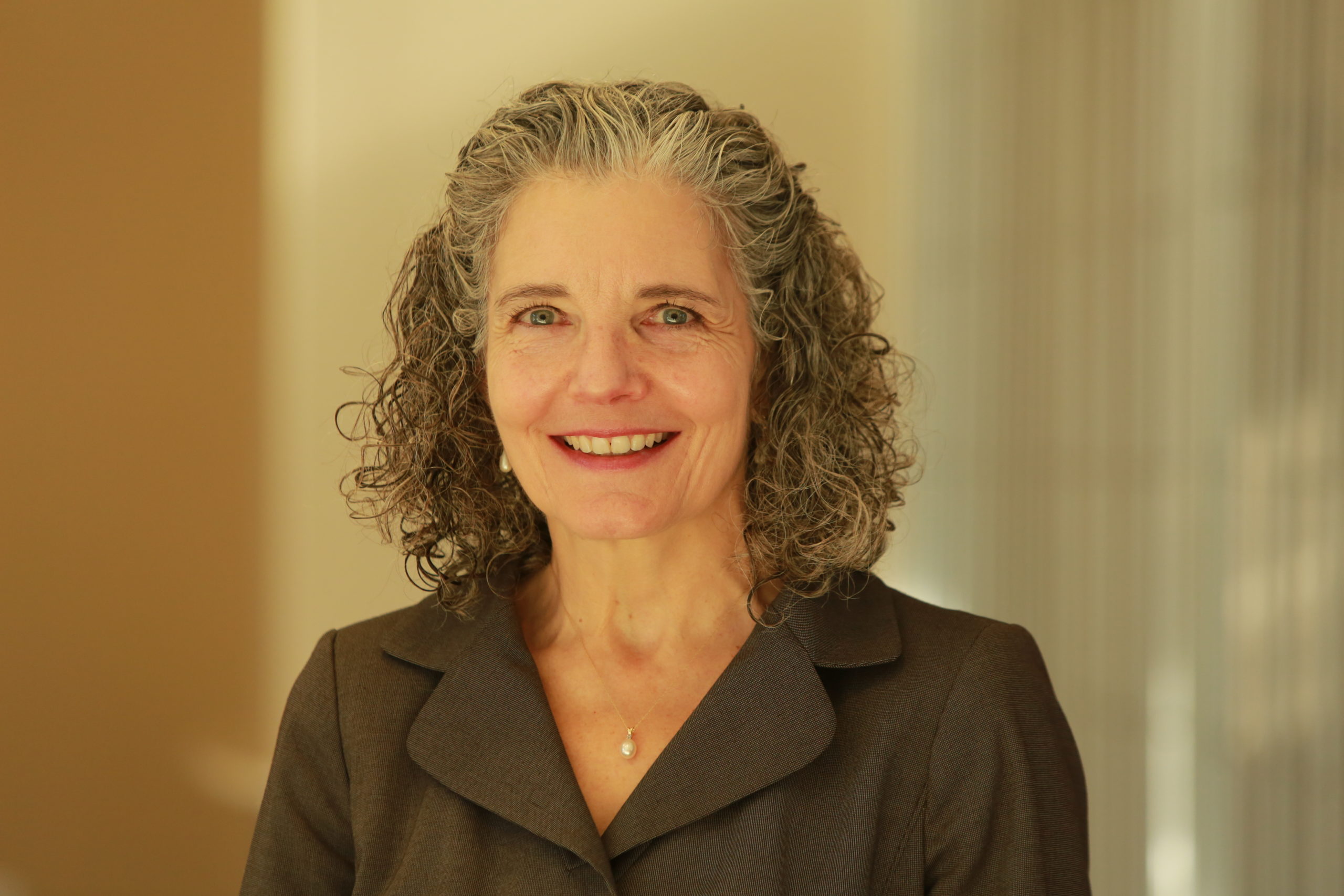
Pamela serves as a Professor of Higher Education and as the Associate Provost of Faculty Affairs and Development at William & Mary in Williamsburg, VA. Her research investigates how community college leaders are supporting social justice on campus, and how leadership development of mid-level academic leaders advances change efforts. As the Associate Provost, she supports faculty members on campus through professional development opportunities, develops and delivers leadership programming, and leads efforts to update policies and processes affecting faculty. Pamela Eddy and her husband David Pape, a retired engineering professor and department chair, live in Williamsburg, VA. They have three adult children and three granddaughters.
How has Allegheny prepared you for where you are today?
Allegheny provided an opportunity to understand how deep relationships and collaboration are central to achieving goals. Faculty knew who you were and supported your intellectual development through challenging you to think critically, to contemplate alternative solutions, and to have the ability to change your mind. Being able to support arguments through research and facts is a skill I acquired at Allegheny that I use every day.
What hobby are you currently pursuing?
I am a runner and am currently training for the New York City Marathon in November. I have done 12 other marathons–including one in Dublin, Ireland! Running provides me a chance to think and when raising kids gave me a chance for time alone–which may be why I kept running further!
Could you identify an individual professor or administrator at Allegheny who was especially influential to you? How do you see their influence on you today?
I will cheat and identify two! I still exchange cards with both of them 40 years after graduation and they have seen our family grow over time.
Dr. Ahmed Hussen was my advisor and major professor in economics. He was the first person who made me believe I could write–I now have 12 authored/edited books to my credit and am currently working on another. Dr. Hussen had us write short, one to two page papers, which required you to be succinct in your arguments. This skill serves me when I am writing up policy briefs to share. Finally, Dr. Hussen was a model for how to teach. He used active learning techniques to engage us in class, provided multiple examples for students struggling with economic principles, and built a sense of belonging in his classroom. Someone would not get an idea we were learning and Dr. Hussen would give examples on supply and demand in terms that related to young students–pizza and wings! If someone didn’t get this idea, he tried another approach until you saw the lightbulb going on! Dr. Hussen took a group of us to an economics competition in New York State. I recall the long car ride chatting and learning more about everyone and the competition where we presented before a group of strangers for the first time. We presented our comprehensive exam research–and I won 2nd prize! This type of external validation helped me gain confidence and allowed me to see the work others were doing in the field. I recall wanting to be the type of faculty member that Dr. Hussen was for me and to help students learn more. All of his strategies have served to guide me in my own teaching.
Dr. Anthony LoBello was my main faculty member for my math minor–I took five of the six required courses for a minor with him. He represents an ideal of liberal arts education by infusing his lectures on math with history, business, and sociology. We were constantly learning about the mathematicians behind the formulas and how the context of their time in history mattered. Not only did we learn math formulas in his class, we learned how these seemingly arcane numbers would help in business to save resources and how we could apply statistics to better understand societal impacts. To this day, the first thing I do when I am trying to understand issues facing the community colleges is look at the data. What are student completion rates? Does the disaggregated data show inequities? How is the college contributing to the local economy? My clearest memory was of a homework problem he gave us–it took me 8-10 pages to complete it. When we arrived at class after Dr. LoBello completed his grading, he told us he inadvertently made the problem more complex and informed the entire class that I was the only one who worked the problem to completion. He lectured us on how tenacity matters–”Would you leave a patient on the operating table because things got complicated?!” I still remember this lesson 40 years later.
What book is on your nightstand today?
On my nightstand are a pile of books! I typically have two or three going at once. Currently, I’m reading Ann Patchett’s Truth & Beauty: A Friendship and this has me reflecting on friendships over my lifetime. I have just started Daniel James Brown’s Facing the Mountain: A True Story of Japanese American Heroes in World War II. His prior book, Boys in the Boat was so well written that this new book promises to be a good read. Finally, I always have a mystery book going. This week it is Louise Penny’s The Madness of Crowds. The book I’m reading for work is Rebecca Pope-Ruark’s Unraveling Faculty Burnout: Pathways to Reckoning and Renewal. The pandemic has exacerbated the increasingly challenging job of being a faculty member.
Do you have a favorite saying, mantra or piece of advice you’d be willing to share?
Every day is a gift. Having seen friends and family members die young, it is evident we can’t take time for granted. What have we done to help others? What have we done locally to make our communities a better place to live? How have we nurtured ourselves to become a better person? How we spend each day is what really matters.
Five Questions with Kelly Mack Boulton ’02
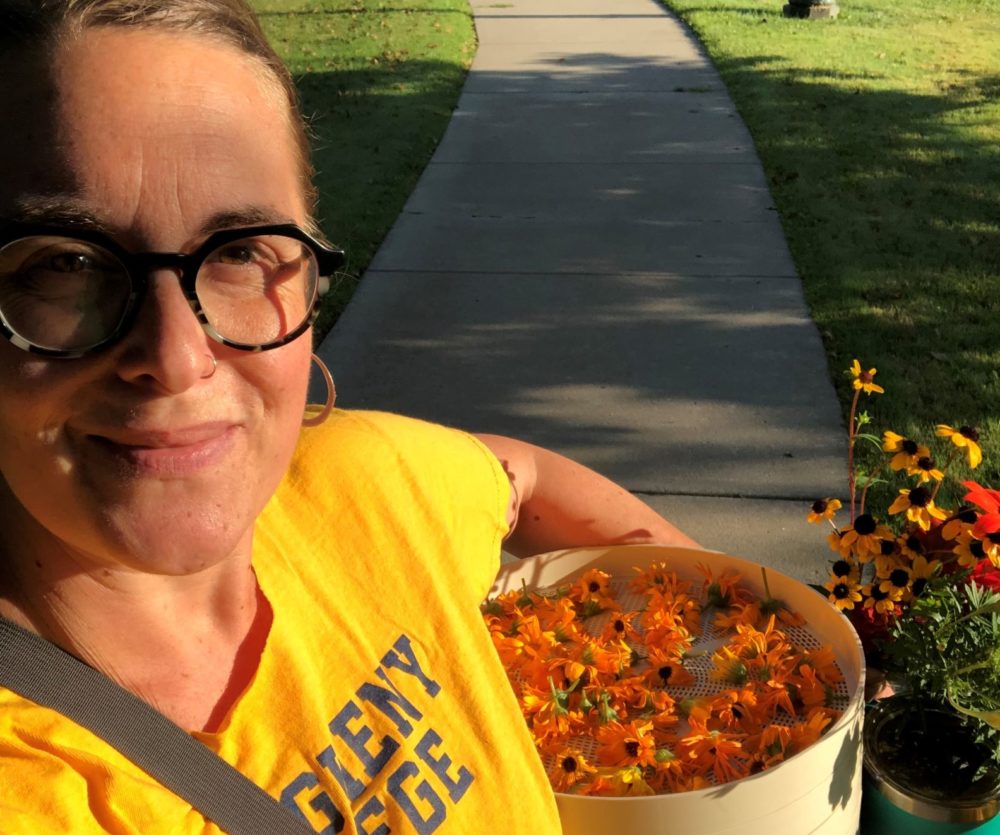
As Allegheny’s Director of Sustainability, Kelly is responsible for visioning, defining, and implementing Allegheny College’s sustainability values and action plan. With her leadership, Allegheny achieved carbon neutrality in 2020. Now her focus is on decarbonization of Allegheny’s campus and developing climate and community resilience on campus and in northwest Pennsylvania. Kelly also manages the Carrden, the campus garden at Carr Hall, and works closely with students as an intern advisor and student group advisor.
How has Allegheny prepared you for where you are today?
Allegheny gave me a lot of opportunities to practice systems-thinking, problem solving, and implementation planning, all while challenging myself to work outside of my comfort zone. Allegheny also taught me how to be a strategic communicator and help me develop strong written and verbal communication skills.
Could you identify an individual professor or administrator at Allegheny who was especially influential to you? How do you see their influence on you today?
Eric Pallant was my advisor and gave me permission to have fun even while trying to solve really serious problems. We still have regular walking meetings in which we solve all the world’s problems in just one loop of Meadville.
Pam McCurdy in the Registrar’s Office and Kathy Uglow in the CEED office were administrators that checked on me everytime I worked in their offices to be sure I was doing well and ready to take on post-graduate life. They reminded me to eat, manage my stress, wordsmithed my resume, and told me to go be amazing. They were essential fixtures of my Allegheny experience.
What book is on your nightstand today?
I just finished reading Psalm for the Wild-built, by Becky Chambers, described as a solarpunk novella, and gifted to me by a friend from my time at Allegheny.
What about Allegheny today makes you especially excited?
Students just came back to campus so every day is filled with conversations with interns, student workers, and student groups about ideas and collaborative plans. I’m always excited about what we can accomplish together.
Do you have a favorite saying, mantra or piece of advice you’d be willing to share?
“Whatever you can do, or dream you can, begin it; boldness has genius, power, and magic in it.”
– Johann Wolfgang von Goethe
Five Questions with Amy Hartzell Pszczolkowski ’91 P’24
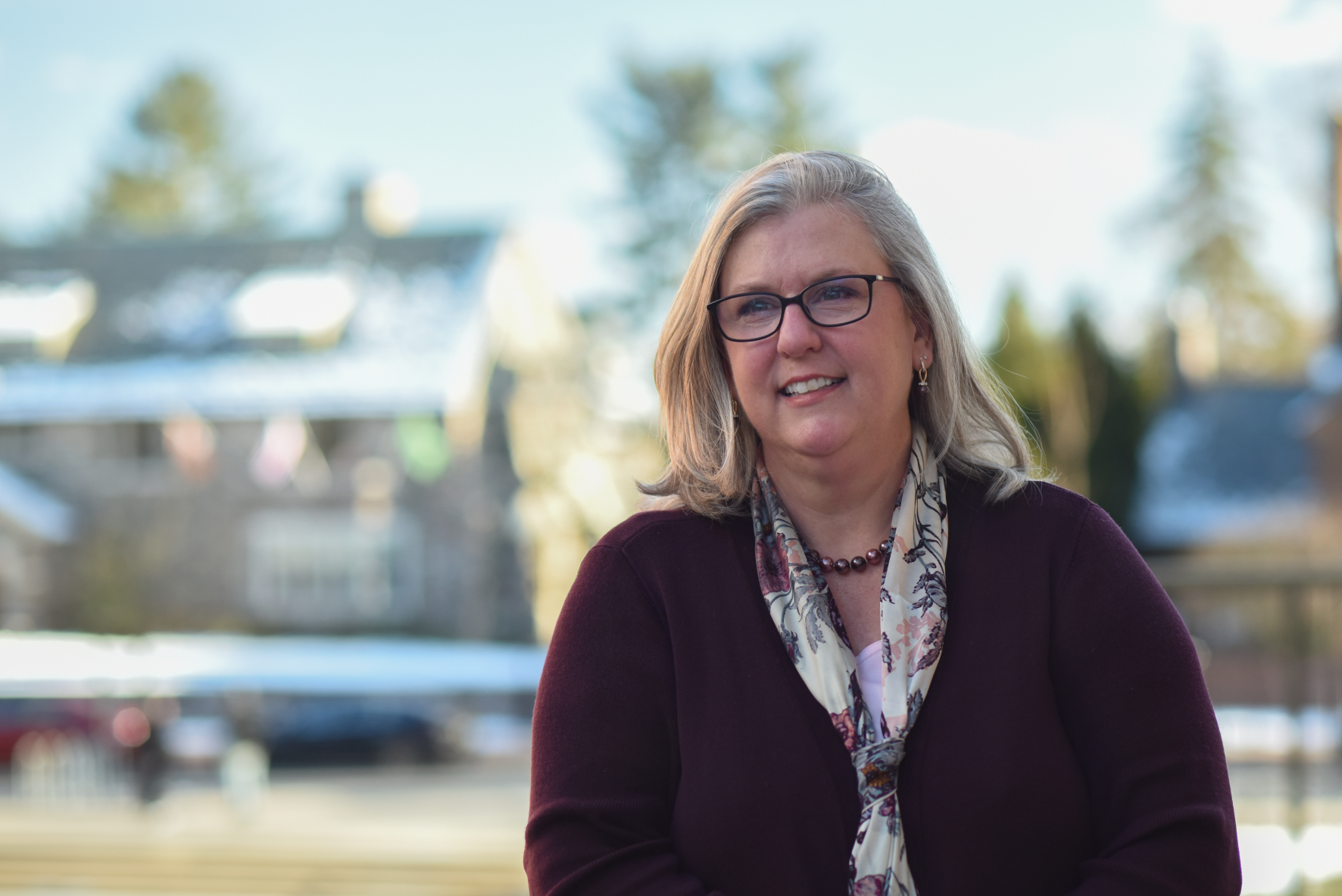
While studying at Allegheny, Amy was a psychology major and French minor. She was involved as a Kappa Alpha Theta and as a Resident Advisor in Ravine and Resident Director in Caflisch. In her position as Associate Director of Career Development and Alumni Relations for the School of Public and International Affairs at Princeton University, Amy works with graduate students in the School pursuing a Masters in Public Policy, Masters of Public Affairs or a PhD. In addition to being a proud alum, she is also mom to current student Joel ’24, and serves on the Parent & Family Council.
How has Allegheny prepared you for where you are today?
Allegheny gave me the well-rounded education that I hoped for and led me to my career in higher education. During my senior year, I was deciding whether to pursue a Masters and work in administration or go on for a PhD and hope to become a professor. Through much soul searching and discussions with mentors at Allegheny, I decided to go to University of Miami of Ohio for my Master in Science in Higher Education Administration with a wonderful advisor, Dr. Marcia Baxter Magolda. This decision set me on my career path and led me to many wonderful opportunities.
Could you identify an individual professor or administrator at Allegheny who was especially influential to you? How do you see their influence on you today?
David McInally’s leadership and student-centeredness had a lasting impact on me as a student, as did Linda Palmeiro who served as a Kappa Alpha Theta advisor. I have enjoyed seeing Linda at Allegheny reunions over the years!
What is one item on your bucket list that you would be willing to share?
My only regret from my college experience is that I didn’t take time to study abroad. As a French minor I would have benefited immensely from a semester or year abroad. I had too much FOMO (fear of missing out) as an undergrad student and had so much I wanted to do on campus. This is all a long way of saying I would love to travel to all over Europe when I have time!
Why is it important to you to support Allegheny as a volunteer? What do you hope to accomplish through your service in the Parent & Family Council?
I have always believed in giving back to the organizations and institutions that have shaped who I am. Volunteering as a Reunion Committee Co-Chair has been a great way to reconnect with Allegheny and my classmates. Now serving on the Parent & Family Council is an opportunity to connect with other Allegheny parents and help share information and resources to support our students and the college. I am most excited about the new opportunity for parents to get involved in career education at Allegheny and support students through advice, networking, job shadowing, and internship and job opportunities.
What about Allegheny today makes you especially excited?
I’m excited to see more diversity on campus today than in my time at Allegheny. I am also excited to see the opportunities that are there for students to pursue research, student abroad, internships and other experiential opportunities to complement what they are learning in the classroom.
Alumni Spotlight: Five Questions with Will Tolliver, Jr. ’14
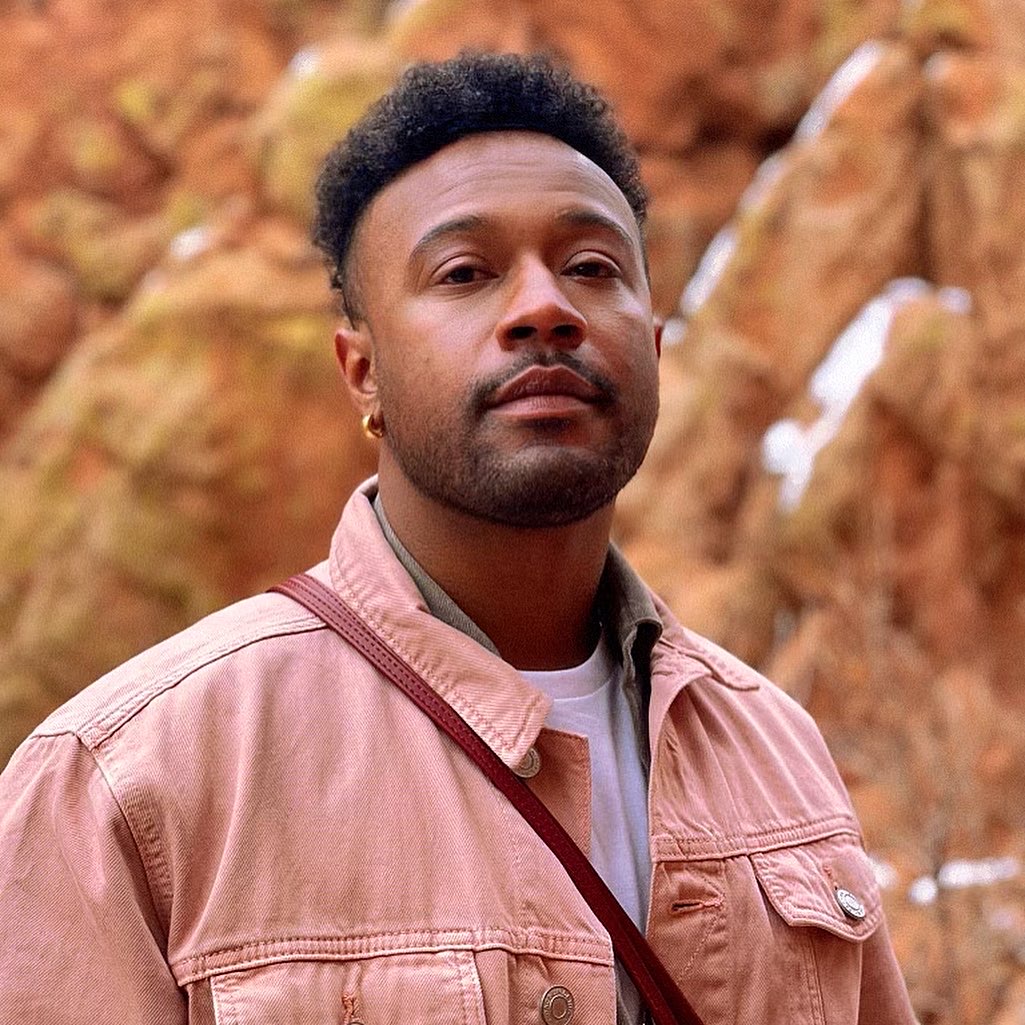
While studying at Allegheny, Will was an Environmental Studies major, involved in Creek Connections and Student Experimental Theater. Will works for Public Broadcasting Services (PBS) as the Associate Director of Audience Engagement.
How has Allegheny prepared you for where you are today?
Allegheny prepared me for where I am today in so many ways. Overall, Allegheny taught me how to understand ecosystems and how all things are connected and that helps me understand workflows, processes, and collaboration. My time at Allegheny also taught me how to interact with people from different walks of life and how to empathize and try to understand differing perspectives. Going into Allegheny, I was a kid from the city with a family that didn’t have a disposable income, and I met students with vastly different experiences, including access to wealth and traveling the world. That was all new to me. My Allegheny experience helped me understand what I wanted and didn’t want for my life, my career and my family.
Could you identify an individual professor or administrator at Allegheny who was especially influential to you?
You know, there were really two people who influenced me during my time at Allegheny. The first being my advisor and good friend TJ Eatmon. TJ really helped me see my pathway through Allegheny and understand the possibilities of being a Black man in academia and the world. There were very few Black professors at Allegheny, and without TJ I am not sure anyone would understand my experience, perspective, and the obstacles I faced at my time at Allegheny, TJ was in my corner and I am not sure I would have made it without him.
The second person that had a huge impact on me is Wendy Kedzierski, the Director of Creek Connections. When I arrived at Allegheny, Wendy reached out to me to ask me to work for Creek Connections. Wendy played a large part in making sure I felt included at Allegheny and really built a community of students through the program. While working with Wendy over my four years, I was able to learn about leadership, project management, and education by observing Wendy be empathetic, knowledgeable and organized. Creek Connections, Wendy, and her leadership have helped me become the leader and professional I am today.
Hobbies or special interests that you are currently pursuing:
I have really been getting into directing, producing, and editing music videos! It is a new skill I have been working with and I have teamed up with pop/R&B artist Samuel Mancini to produce some really cool videos. You can check out these videos on Youtube by searching for Samuel Mancini’s official videos for Infatuation and Undone (Summer of ‘87).
What about Allegheny today makes you especially excited?
One thing that excites me right now about Allegheny is the Pittsburgh Alumni Chapter. I am part of the board and we have some really cool and unique things brewing, and I am excited to share about them when details get firmed up. It has been a joy to connect with folks around our shared experience and the hope to grow and network together within the Pittsburgh region.
Do you have a favorite saying, mantra, or piece of advice you’d be willing to share?
This too shall pass.
Alumni Spotlight: Five Questions with Jennifer Haddox-Schatz ’00
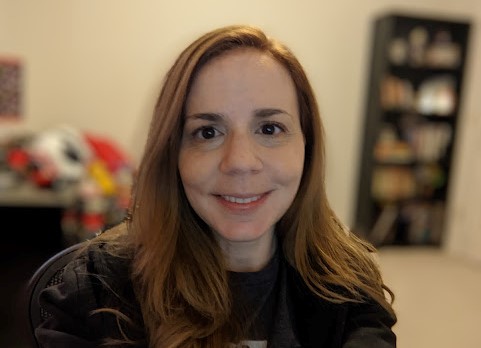
While studying at Allegheny, Jennifer was a computer science major, with minors in mathematics and political science. She went on to receive her master’s in computer science from The College of William and Mary and currently works at Daniel H. Wagner Associates, Inc. Jennifer served as president of Allegheny’s student chapter of the Association for Computing Machinery during her junior year.
How has Allegheny prepared you for where you are today?
The education I received from Allegheny set me on a wonderful path for my 20-plus year career. The Allegheny computer science curriculum’s focus on problem solving, analytical skills and other foundational concepts fully prepared me to both quickly learn and effectively utilize new tools/technology at certain points during my career, and also modify/debug decades-old legacy code at other points. Additionally, the communication skills emphasized by the College in general and the Computer Science Department in particular have been equally important. Critical aspects of my job include documenting algorithms and debugging efforts, writing user guides and software specifications, and remotely troubleshooting software problems for clients. All of the aforementioned tasks depend on my ability to communicate complex technical concepts both orally and in writing.
Could you identify an individual professor or administrator at Allegheny who was especially influential to you?
The late, great, Dr. Robert “Cup” Cupper taught me as much about the importance of building strong relationships based on mutual respect with colleagues/classmates as he did about computer science. The spirit of camaraderie that Cup fostered and promoted among the department’s students has lived within me and guided me for the last two decades. It has served me well by leading me to a small company with a family-like atmosphere in which the employees not only work well together, but also genuinely care about and advocate for each other. About six years ago, Cup’s influence motivated me to launch an informal mentoring program pairing new software developers with senior employees so that our youngest colleagues feel welcome and supported. It also prompted me to work with several colleagues to propose to our company’s senior management team that we modernize our leave policy.
Why is it important to you to support Allegheny as a volunteer and what do you hope to accomplish through your service on the Alumni Technical Advisory Board (TAB)?
I hope in some small way to give back to a college and a department that have blessed me so much, both professionally and personally. I met my husband of 20+ years interning as a software developer at a Northern Virginia firm founded by an Allegheny alum who recruited Allegheny computer science students. Thus, I have Allegheny to thank for both a satisfying career and very happy personal life with my husband and our 5-year-old daughter! Through my work on the computer science department’s TAB, I’m hoping to motivate fellow computer science alumni to also give back to the department and hopefully be able to continue mentoring current Allegheny computer science students.
What about Allegheny today makes you especially excited?
I am absolutely thrilled to see Professors Greg Kapfhammer ’99 and Janyl Jumadinova and their colleagues leading the Computer Science Department today with the same care, dedication, and enthusiasm as Bob Cupper, Mary Bivens and Robert Roos did 20-plus years ago when I was a student. I therefore have every confidence that today’s Allegheny computer science students will be quite successful in the technology field in the years to come.
What book would you recommend today?
How Is This My Life: Confessions of a Sane Single Woman by J.R. Mason. This humorous read chronicles the author’s stranger-and-more-hilarious-than-fiction dating life. It was the perfect medicine during the pandemic when I was isolated at home and really needed something to provide an escape and make me laugh. Full disclosure: I’ve known the author for 35 years and she asked me to serve as an unofficial proofreader/editor for this book. I happily volunteered, and certainly utilized my liberal arts education in this endeavor!
Alumni Spotlight: Five Questions with Rachel Kreiss ’95
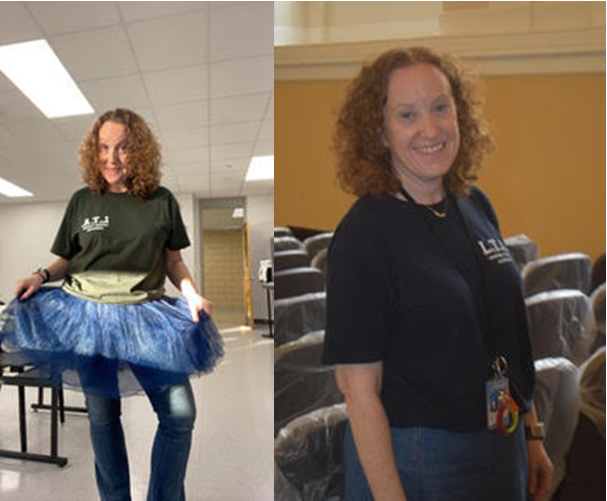
While studying at Allegheny, Rachel was a psychology major, with a concentration in music theory and history. She interned at Vallonia Industries, a nonprofit organization that provides a comprehensive vocational rehabilitation program to individuals with disabilities. Since then, Rachel has been a special education teacher for 25 years, and she let us know that she wears a tutu every Tuesday to school! Rachel has served as a Gator Greetings writer to prospective students for 13 years in a row.
How has Allegheny prepared you for where you are today?
After graduating, I spent a year abroad before attending graduate school. When I began my graduate studies, I was anxious that I would not be able to keep up with my peers, but quickly realized the academic foundations that I received from Allegheny truly prepared me for life as a graduate student. Professionally, as a special education teacher, so much of what I learned in the classrooms of Carnegie Hall play an integral role in my teaching career.
Could you identify an individual professor or administrator at Allegheny who was especially influential to you?
Dr. Rodney Clark was my professor for many behavioral psychology classes and my Senior Comp advisor, but his impact on me was more like that of a mentor. What I learned from him both in and outside of the classroom helped me excel as a student but more importantly has had a direct impact on my day-to-day life as a special education teacher.
Why is it important to you to support Allegheny as a volunteer?
I have been writing Gator Greetings for the last 13 years. It gives me such pride as an alumna to write to prospective students about my experiences at Allegheny. I believe it is important to be a voice for the College and maintain a bridge between alumni and future Gators.
What is one item on your bucket list?
I want to hike the Inca Trail up to Machu Picchu. I have been fortunate to travel throughout Europe and South America is the next continent I would love to explore.
Do you have a favorite saying, mantra, or piece of advice you’d be willing to share?
“Living the Dream!”
Alumni Spotlight: Five Questions with Xun “X” Li ’09
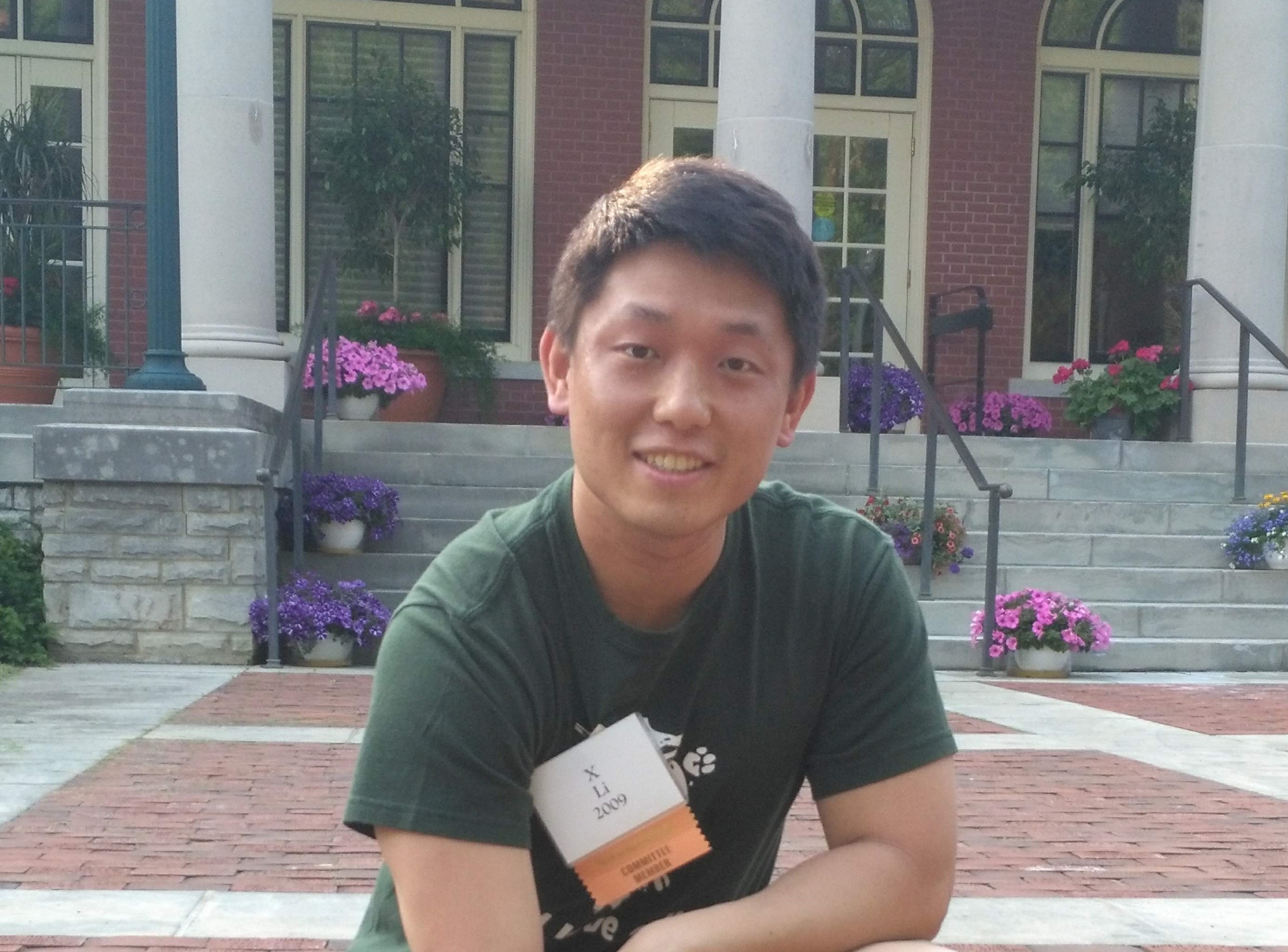
While studying at Allegheny, X was a neuroscience and psychology double major. His interests and skills span the entirety of surgical spinal care, from pediatric and adolescent scoliosis, to adult spine tumors, to degenerative spine conditions. X has volunteered as a Reunion Committee member, Class Agent for the Class of 2009, and now as a member of Allegheny’s Alumni Council.
How has Allegheny prepared you for where you are today?
Allegheny nurtured my budding interest in the human nervous system, encouraging me to explore it from both a biological and a psychological perspective with its emphasis on having a major and minor from different concentrations.
Could you identify an individual professor or administrator at Allegheny who was especially influential to you?
Dave Roncolato was the first person I met after arriving on campus. Being a Bonner Scholar in its inaugural class, I would not have been able to accomplish half of what I did during my time at Allegheny without his constant encouragement, optimism, and enthusiasm to see each and every one of us succeed.
Why is it important to you to support Allegheny as a member of the Alumni Council?
I hope my role on the Alumni Council helps to break barriers to higher education. Coming from a middle-class family of first-generation immigrants, higher education was prohibitively expensive. Allegheny was one of the few colleges that worked with me to resolve the financial challenges I faced and gave me the opportunity to attend college.
What about Allegheny today makes you especially excited?
Witnessing the “Our Allegheny: Our Third Century Quest” campaign fulfill its goal last year excites me. I am thrilled to see the transformation Allegheny is poised for over the next 100 years.
Do you have a favorite saying, mantra, or piece of advice you’d be willing to share?
“Fall down seven times, get up eight.”
Alumni Spotlight: Five Questions with Nikki Hawk ’18
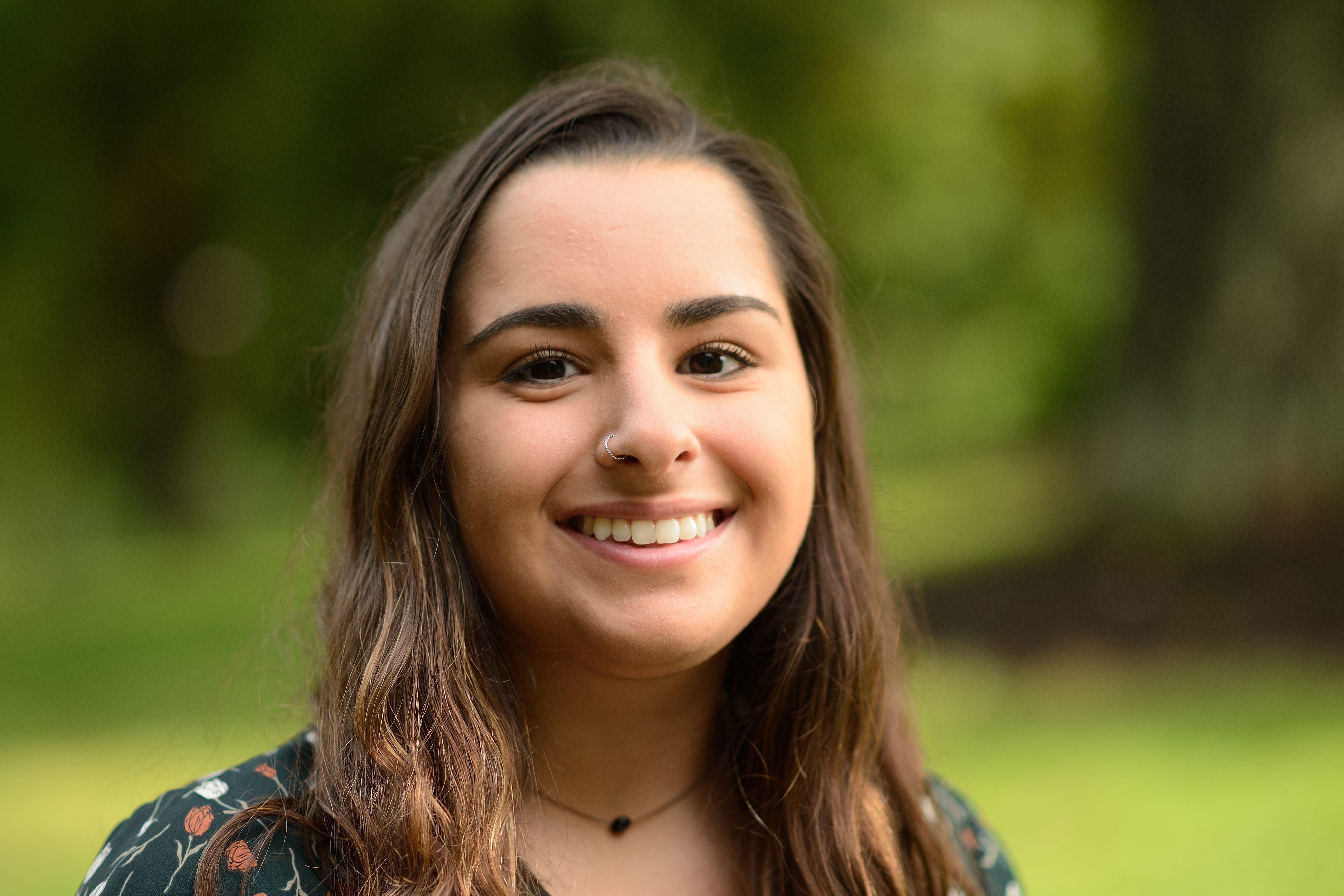
While studying at Allegheny, Nikki was a biology major, with minors in Spanish and global health studies. She participated in the health coaching program as well as an experiential learning term in Nicaragua. Nikki now volunteers as a Class Agent representing the class of 2018, encouraging involvement and philanthropic support from her classmates.
How has Allegheny prepared you for where you are today?
Allegheny has prepared me for where I am today by pushing me to work hard and to step outside of my comfort zone. I had amazing professors and friends that would always help me to reach my fullest potential. During my time at Allegheny, I was able to learn so much about science, public health, Spanish, communication, relationship strengthening and building, and so much more. After graduation, I felt very prepared going into the world on my own and tackling grad school. I have lived on my own ever since graduation, and I am currently fulfilling my second graduate program — all thanks to Allegheny for giving me the knowledge, resources, skills, and confidence to accomplish whatever I put my mind to!
What book is on your nightstand today?
A book that is always on my nightstand is Gmorning, Gnight!: Little Pep Talks for Me & You by Lin-Manuel Miranda. It has so many encouraging words and nuggets of wisdom filled within it, and I highly recommend for everyone to read it! You can read it cover to cover, or you can just open it up to a random page every day for a little pep talk!
Why is it important to you to support Allegheny as a class agent?
Being a class agent is important to me because I am able to help get fellow alumni more involved in Allegheny and its mission to the community and its students. It is exciting to be able to connect with classmates regularly and to be involved in events, such as Gator Give Day and GivingTuesday. I hope to continue spreading the word about Allegheny and get more of my classmates involved with me, whether that be through donations or volunteering their time!
What is one item on your bucket list?
One item on my bucket list would be to travel to Australia to see the Great Barrier Reef, one of the seven wonders of the natural world. I would absolutely love to see all of the beautiful marine life in the world’s largest coral reef.
Do you have a favorite saying, mantra, or piece of advice you’d be willing to share?
A mantra that I always repeat to myself is “just be.” It helps me to refocus and recenter when life gets hectic and busy. A quote that I have always loved since I first saw it on a Dove chocolate wrapper is “You are the star for which all evenings wait.” It just makes me feel so happy and at peace.
Alumni Spotlight: Five Questions with Keith Steiner ’73
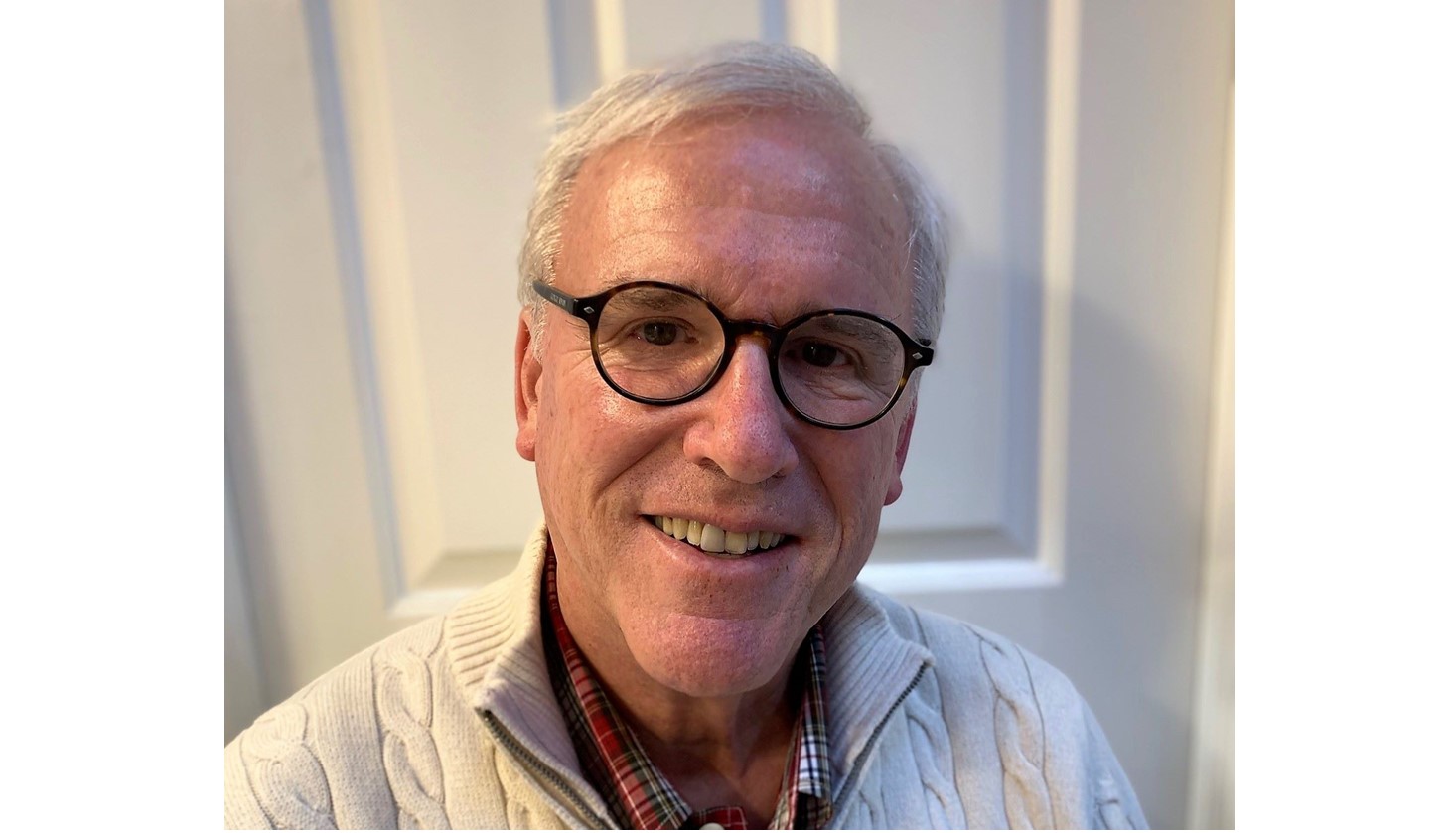
While studying at Allegheny, Keith was a history major, a student athlete competing in Track and Cross Country, and a member of Delta Tau Delta and Interfraternity Council. Additionally, he was a sports writer for The Campus Newspaper. Keith has served on Alumni Council, Reunion Committees, and as the campaign chairman for the Delta Tau Delta Sesquicentennial Campaign. Keith now volunteers as a Class Agent representing the class of 1973, encouraging involvement and philanthropic support from his classmates.
Can you identify someone from Allegheny who still influences you today?
History professor “Skipper” Knights led me and advised me through my Senior Comp. His high standards and encouragement pushed me to put in my best effort at Allegheny. My topic was “A History of Alpha Chapter of Delta Tau Delta,” and during the course of research, I had the opportunity to travel and meet personally with many alumni of Allegheny and Delt Chapters of other schools. With Skipper’s guidance, I documented the Allegheny Chapter’s role in the history of the College, as well as the Chapter’s leadership in inclusive membership in all of Delta Tau Delta.
After graduation, my Comp led to twelve years on the Delta Tau Delta Headquarters staff. This experience working with non-profit organizations enabled my subsequent thirty-five year career with UBS advising other fraternities, sororities, charitable and health benefit funds.
Why is it important to you to support Allegheny as a class agent?
Through my service, I hope to help encourage more donations to advance the educational mission of the College.
What about Allegheny today makes you especially excited?
How Bentley Hall has been transformed into a beautiful, useful and carbon neutral building.
What hobbies are you pursuing?
As the world reopens, my wife and I will resume traveling in 2022. Possible destinations include the Panama Canal, Switzerland, Spain and the Baltic countries.
What book is on your nightstand today?
This year’s books include Cloud Cuckoo Land by Anthony Doerr, Sooley: A Novel by John Grisham, 1941: The Year Germany Lost the War by Andrew Nagorski, Facing the Mountain: A True Story of Japanese American Heroes in World War II by Daniel James Brown, The Black Church by Henry Louis Gates, Jr., and The Last of the Tin Can Sailors by James D. Hornfischer.
And of course I read Nature’s Best Hope: A New Approach to Conservation That Starts in Your Yard by our own Doug Tallamy, Allegheny ’73 and Delt pledge brother!
Alumni Spotlight: Five Questions with Zack Rearick ’10
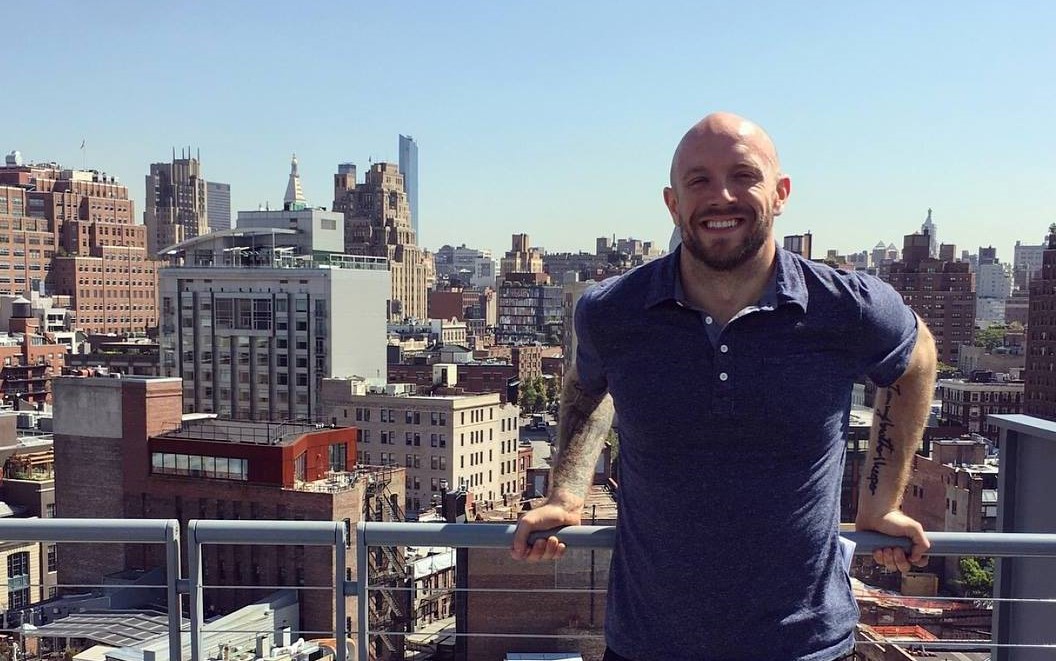
Zack leads teams within Brian Communication, supporting clients on a variety of strategic communications and public relations needs. In his work, he partners with brands on media relations and integrated marketing, as well as crisis management, stakeholder relations, issue advocacy, and more. Zack started his career in organized labor and political action, and now brings a campaign-style approach to his work. While studying at Allegheny, Zack was a Communication Arts and Political Science double major.
Why is it important to you to support Allegheny as a career resource for students?
There are challenges that come with being a first-generation college student, but I always felt supported at Allegheny. Professors and staff were generous with their time, and alumni were generous in offering guidance and helping to make connections. Supporting current students is a small way to pay it forward and stay active in a community that I love.
Can you identify someone from Allegheny who still influences you today?
So many people at Allegheny have touched my life. I’m grateful for all of them. Professor Ishita Sinha Roy, in particular, has been an important influence. I’m still proud of the comp I wrote under her guidance, and I think often of her mentorship style. For me, she exemplifies the academic rigor and personal care and attention that are hallmarks of the Allegheny experience.
What book is on your nightstand today?
My favorite books this year were All the Young Men by Ruth Coker Burks; Good Strategy / Bad Strategy by Richard Rumelt; All That She Carried by Tiya Miles; and Darryl by Jackie Ess. I am currently re-reading Isabel Allende’s The House of the Spirits, which is an all-time favorite that I come back to periodically — always finding new layers.
What about Allegheny today makes you especially excited?
The jobs of the future will require a human touch: care, creativity, and insight that can’t be replicated by machines. More critically, the world needs leaders from diverse backgrounds who can work across disciplines to tackle big challenges. I can’t think of better preparation than a liberal arts education, and I truly believe that Allegheny is second to none in cultivating this kind of problem-solver.
What is one item on your bucket list?
Write a novel!
Alumni Spotlight: Five Questions with Afua Osei ’08

Afua is a social impact leader with global experience in securing high value partnerships, developing innovative entrepreneurship programming and leading high achieving teams. As a co-founder of She Leads Africa, Osei built a digital lifestyle platform for millennial multicultural women reaching more than 800,000 women across 100-plus countries. Before becoming a full time entrepreneur, Afua was a management consultant at McKinsey & Company, Fulbright Scholar in Malaysia and intern in the office of former First Lady Michelle Obama. Afua was a Political Science and Black Studies double major.
How has Allegheny prepared you for where you are today?
When I went to Allegheny College, I met people who had so many different types of experiences than I did, and it really pushed me to think about a world bigger than myself. To think about others’ backgrounds and life choices, and how those aspects influence why they make the decisions they do and how they show up in the world. It was a really interesting opportunity for me to step outside of myself and see where others are coming from. This has been so powerful to me throughout my career, from being a political consultant and communicating important issues to different constituencies, to being a management consultant and understanding how business decisions could impact different stakeholders, to being an entrepreneur and thinking about how to position products in front of a diverse audience.
Can you identify someone from Allegheny who still influences you today?
There are actually three people who were so impactful to my experience:
- Dr. Richard Cook, who wrote my recommendation letter for me to become a Fulbright scholar in Malaysia. No one else I knew had a letter from their college president! That was such an incredibly unique thing about my Allegheny experience. The community was so close knit, and I felt deeply connected to Dr. Cook and his wife Terry.
- Professor Bob Seddig of the political science department, who spoke with such seriousness and thoughtfulness. He held us to such a high standard and expected excellence. I also appreciated that he always emphasized research and critical thinking.
- Dr. Terrence Mitchell, who was one of the first leaders in diversity and inclusion at Allegheny, and was so supportive of multicultural students. It was really great knowing that there was somebody looking out for us and cared about our wellbeing. I was 6 hours from home, but I knew I was going to be alright because there were people like him looking out for me.
What book is on your nightstand today?
SuperMaker by Jaime Schmidt, the founder of Schmidt’s Naturals. I really like to read about other entrepreneurs. People who had a vision in their minds and decided to turn it into something. It’s so powerful and encouraging because every single thing in the built environment around us came from an idea in someone’s head. It means that what we see right now doesn’t have to be our future; there is a lot more we can do with our skills and talents.
What is one item on your bucket list?
I definitely plan to go to Antarctica. I saw that National Geographic has cruises from South America to Antarctica and when I saw that, I knew I had to go.
What about Allegheny today makes you especially excited?
Two things: Dr. Link and the students. Allegheny is going to benefit tremendously from having Dr. Link as the new president, with all of the energy, vision and creative ideas that she brings from her breadth of experience. And this new generation of students who are concerned about new issues and are thinking about their college experience in a different way. It’s exciting to see how the College continues to evolve and change as the needs of the students continue to change. I am really optimistic about our future.